#very stereotypical geeky dude
Text

finally worked out a version of my riddler i actually kinda like. he has a new look almost every year, this man is not consistent at all. waynetech edward is not as sexy a look as he thought it was at the time.
literally just an amalgamation of all my fave riddlers into one, just very ZY inspired bc he’s my fave and i wanna smooch him <3
#batman#my art#dc fanart#the riddler#batman fanart#edward nashton#dc riddler#edward nygma#edward nigma#my eddie#very stereotypical geeky dude#like he will rant to you for hours about internet safety#and then download the sketchiest shit ever#just mansplains shit to u and if u zone out ONCE he’s restarting the entire talk
340 notes
·
View notes
Text
…the ugly. SYAC: The Master Review 4
Last post I covered much of what I consider the good or passable strips of SYAC of the pre-Dobbear era. What I have admittedly not covered yet, were three certain characters of the strip that exist beside Dobson.
Persistent Pam

Curmudgeonly Carl

And… this guy I am not even sure has a name.
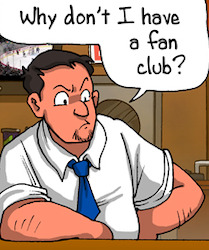
No, seriously. He shows up in like the 61th strip of the series for the first time and yet I never see his name mentioned once

All I know is that he is an accountant, who pities Dobson (for good reason)
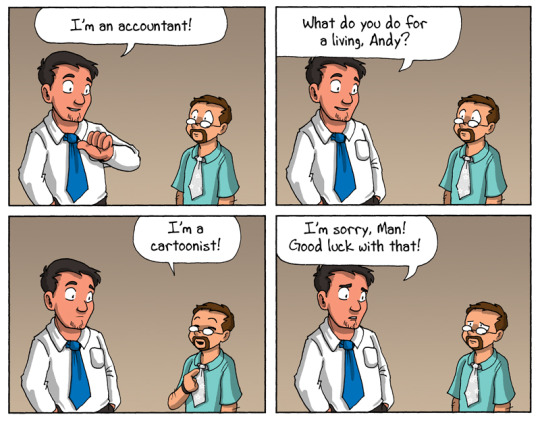
And despite Dobson not liking alcohol, they regularly meet up in a bar as if they are some late 80s comedy duo
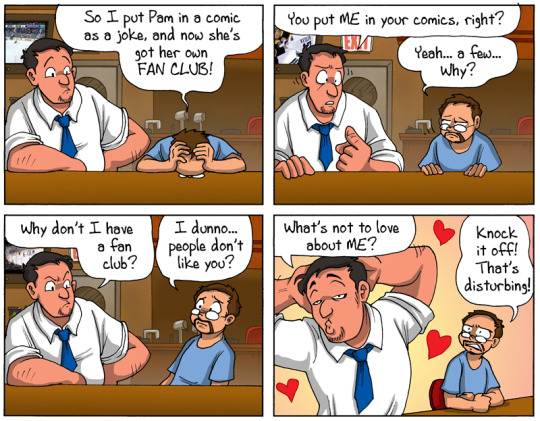
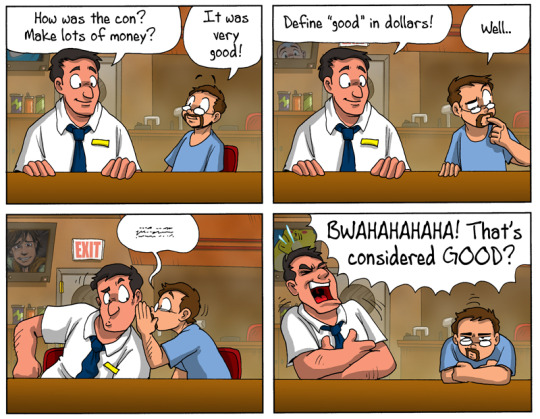
Funnily enough, he shows up way before Pam, who would have her premiere in these strips
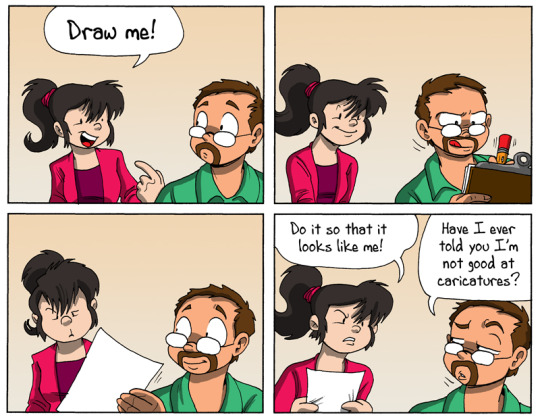
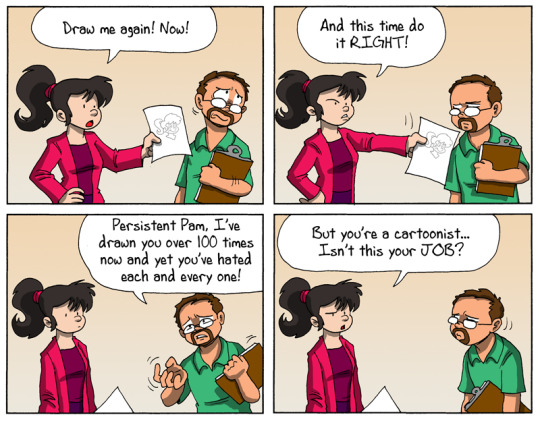
And despite only showing up in a few strips after her premiere (mostly to make “fun” of overbearing and snarky commissioners I suppose…)
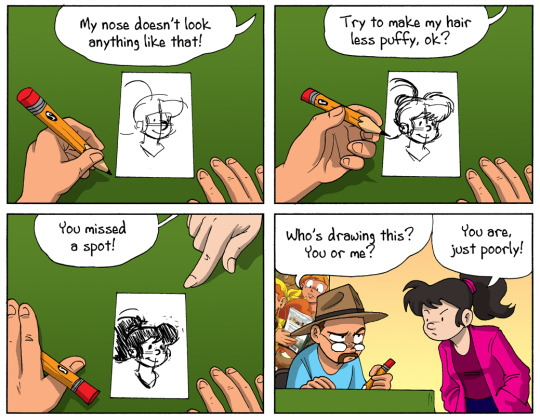
She actually managed something no other character or series by Dobson managed to get: A fanclub
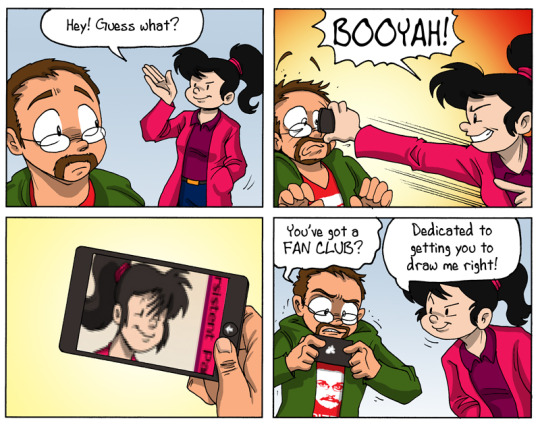
Not that she would really be of any major importance afterwards.
As for Carl, he is supposed to be something like an antagonistic embodiment of Dobson’s “old” art teachers and people being stuck in old ways, who shows up for the following strips forming a sort of arc.
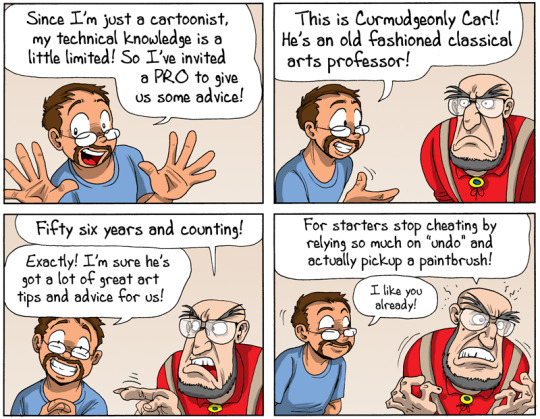
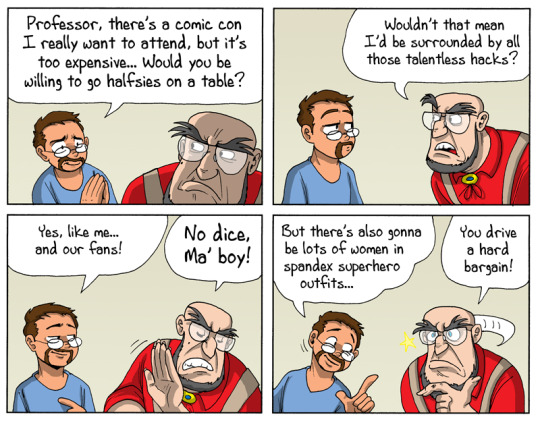
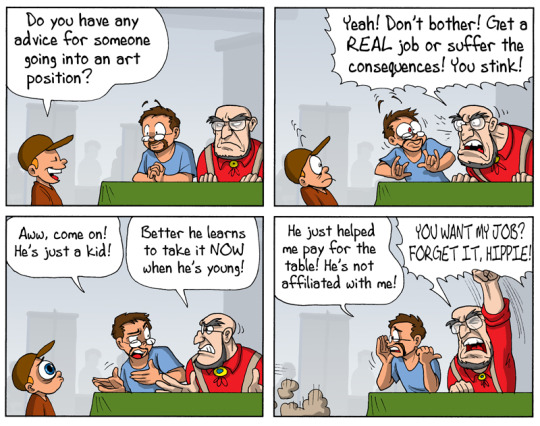
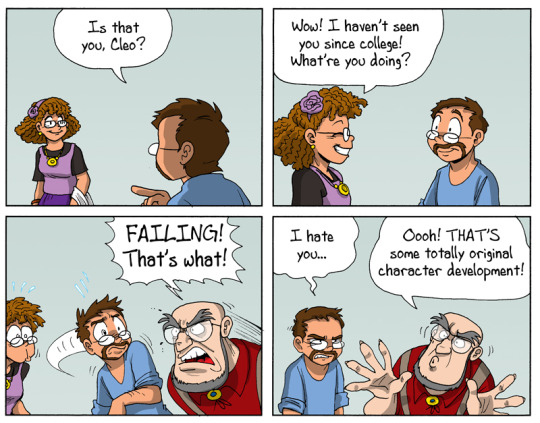
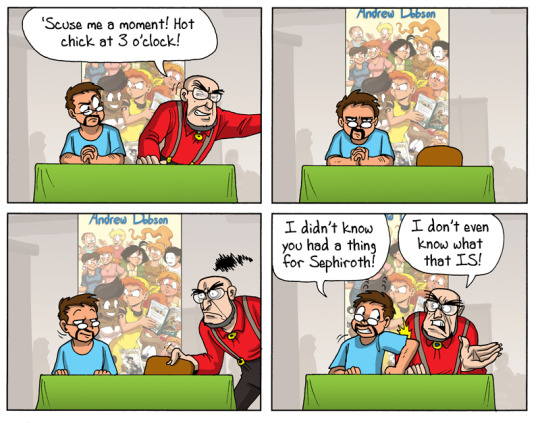
In addition, it is very obvious, that Carl is supposed to be a mockery of people flaming Dobson. Not helped by the fact that THIS character sheet of him made by Dobson assures us, that there were quite a few even less “endorsing” things he wanted to name the character.
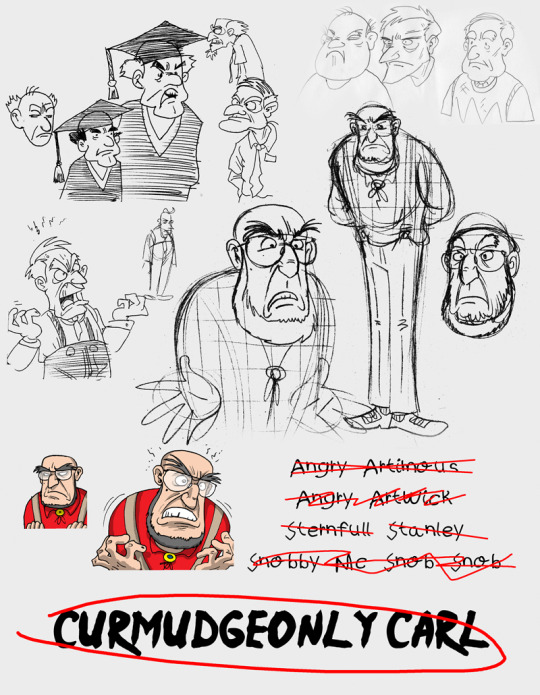
Yet funnily enough, Carl turned into such a popular character with readers, Dobson was essentially “forced” to make him reappear in other strips. Not of the “classical” SYAC strips, but he showed up as the “antagonist” to Tenku in the storydriven multi pagers. Though even antagonist is a strong word, as he is essentially more of a jerkish art teacher and college advisor who is harsh on Tenku, but actually has his best interests in mind. To the point he even offers him to be his “harsher” art critic in the years till he enters college, because he wants to see him grow artistically.
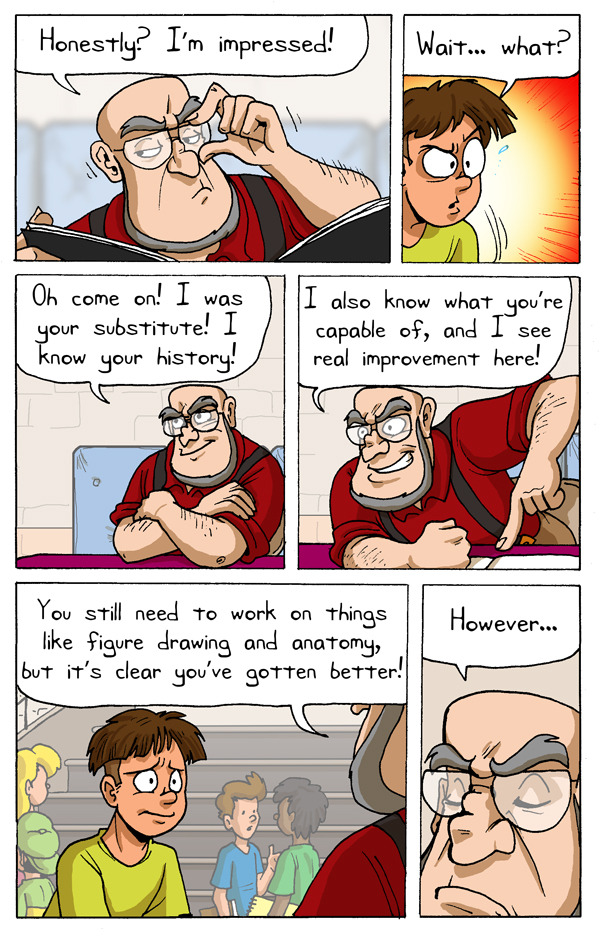
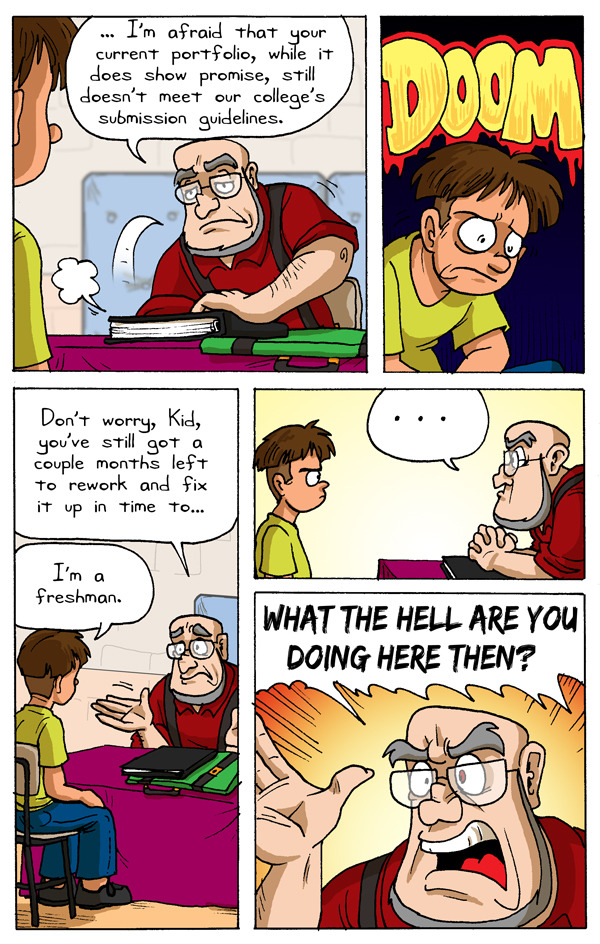
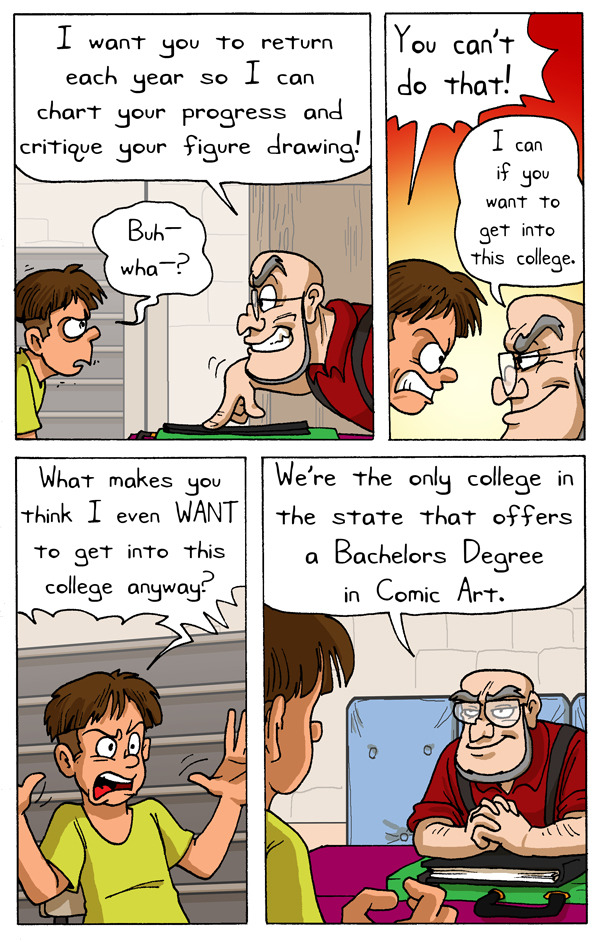
However, Carl was also more of an “accident”. Cause when it came otherwise to tackling criticism or things that irked Dobson (and were not anime related) he would end up more or less creating strips that painted him in a manner where he would supposedly always look like “the better” compared to his opposition or mock it. Which is where a lot of the irk Dobson would earn over the years eventually comes from.
Now to be fair, I do not want to call every comic in that regard “strawmanning”, nor do I want to say that Dobson doesn’t have the right to also mock to a certain extend the mentality of certain “snobs” and so on. For example…
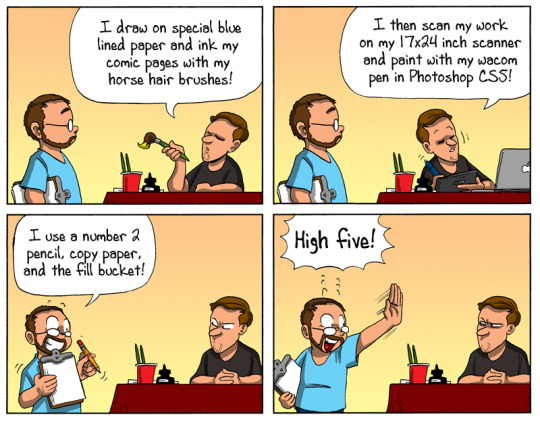
On one hand, I know there are people out there who think they are “special” by having the best tools at their disposal. When in reality you can achieve good results also with less expensive stuff. So mocking that sort of attitude is fine to me to some extend
BUT, when you also make down the line a comic like this…
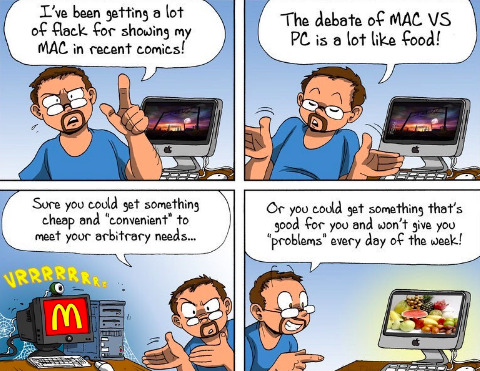
… essentially making yourself come off as a “better” artist or person than others because you have “chosen” the better mass produced crap (btw, that is coming from someone who types this review on a Mac that runs Windows) , then the hypocrisy ends up to be rather strong with you.
Which is also essentially the biggest issue with the strips I am about to show. The hypocrisy of Andrew Dobson. And no, I do not mean the tumblr blog by that. I mean the simple fact, that the content of some of the soon to follow strips gets kinda muddled when you take into consideration some of the things real life Dobson had said and done either at the time or in the years to come. Well that and the way how he tries to mock issues people have with his work, not realizing how he is essentially just reassuring those “silly critics” in their opinions while making his flaws more obvious to people that may have been previously unaware of them.
But enough talk, let me just show you in quick succession examples to confirm said point.
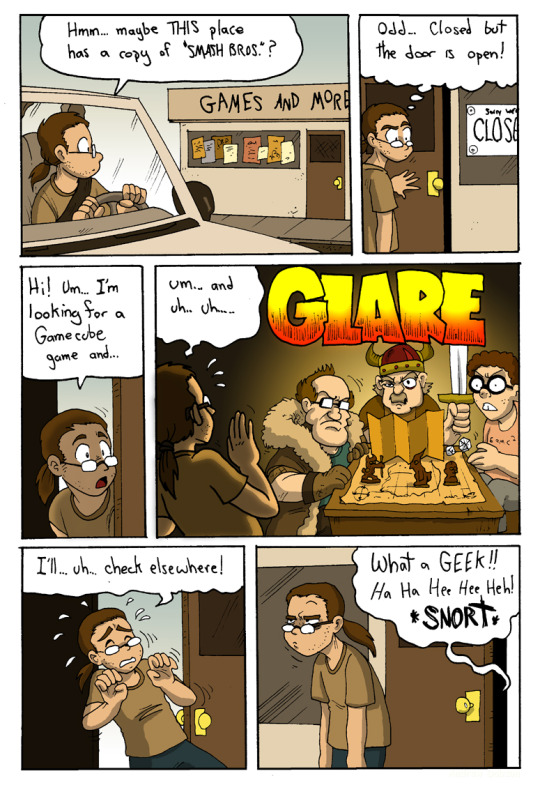
Considering Dobson’s longterm disdain for DnD you have to wonder what the joke really is outside of him portraying DnD players as ugly nerds, supposedly too geeky even for him. Which is hilarious in hindsight as he would years later become a fan of TAZ among other things.
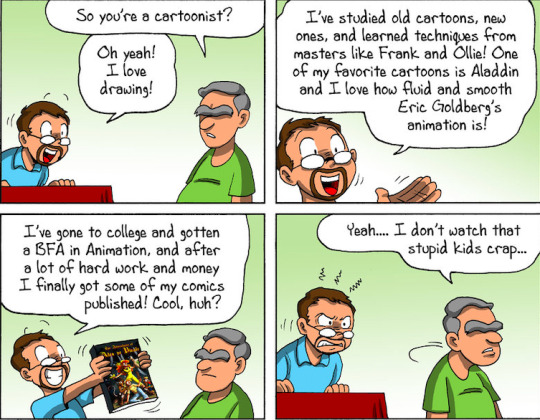
Less hypocritical but the set up is kinda flawed. Like, you are obviously at a convention trying to sell stuff. Why would some old dude not interested in “kids crap” be at the convention anyway? Is he just bringing someone there and just wants to go, but first needs time to belittle your life choices?
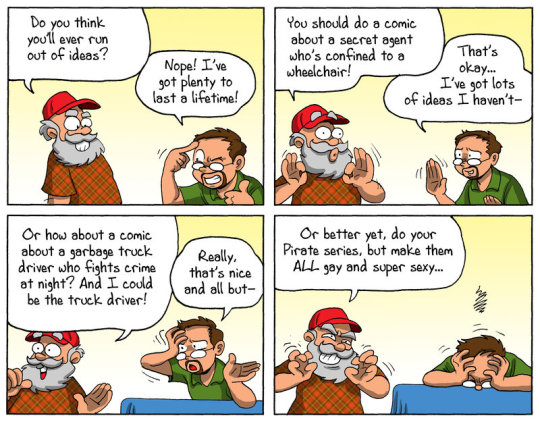
Rather hilarious in hindsight to me. Cause for someone claiming he has ideas that last for a life time and who seems rather distraught on the idea of others giving their input, he turned out to be so in need of ideas. Alex ze Pirate e.g. became from 2015 onward only defined by Dobson talking about the sexualities of his characters (and not even in comic as by that point it was discontinued, but rather in tweets and so on). Formera, which ran heavily on cheap shonen anime tropes ended up cancelled after two volumes, Cabin Rest was a failure after 20 strips, 2019 he relied primarily on cheap comics about Miraculous Ladybug and his understanding of certain genres is so bad, he can’t even think up the most basic ideas for a magical girl story.
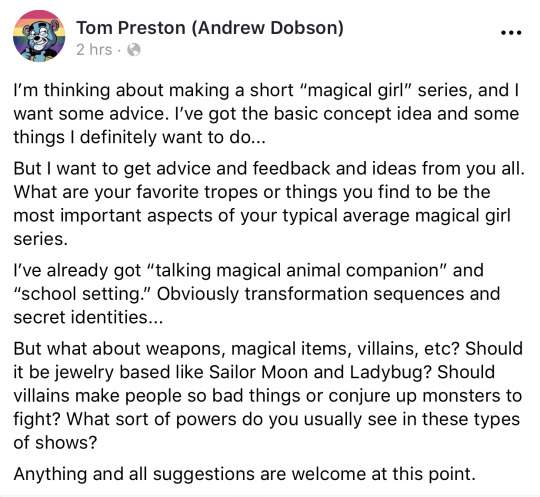
Weirdly enough, that pitch of a garbage truck driver who fights crime? I think that could make for an enjoyable short story about a vigilante a la the Punisher or Sin-City.

The way Dobson perceives criticism, while also essentially giving a quick rundown how he appreciated criticism in his childhood way better than in adulthood. Yeah, because criticism by your parents as a kid was always VERY constructive. (looks back at certain drawings from own childhood) brrr. And sorry Dobson, but sometimes criticism by strangers is better than criticism from friends. Cause friends may mince their words. Plus people have over time given you quite some insightful criticism aside “U SUX” when it comes to comics. You were just never willing to listen

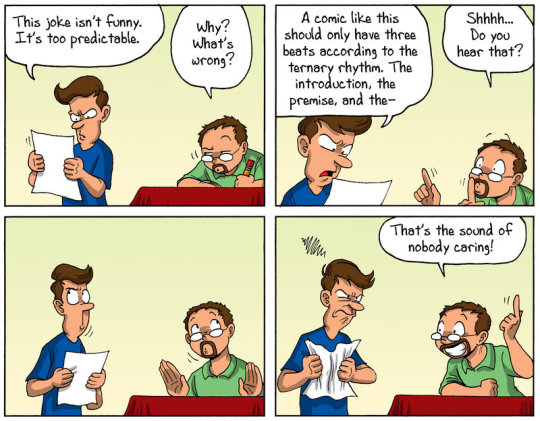
Hey Dobson, you hear that? That is the sound of your career, dying and no one caring.
Yeah, I think someone who made such “brilliant” comedy as in these comics, totally has the right not to listen to what seems to be solid theoretical advice.
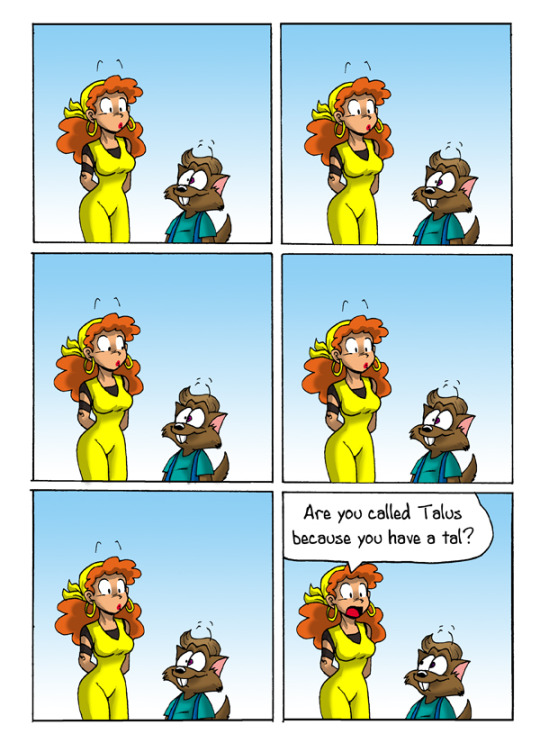
BTW, that Talus comic… I swear to god the worst “joke” Dobson ever told.
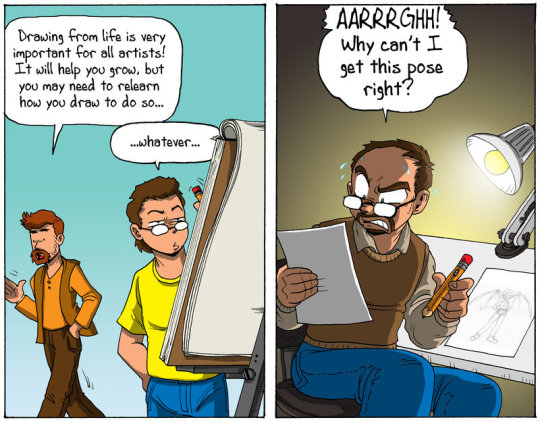
Wow. You essentially make a point why you suck at drawing. While still not trying to change.
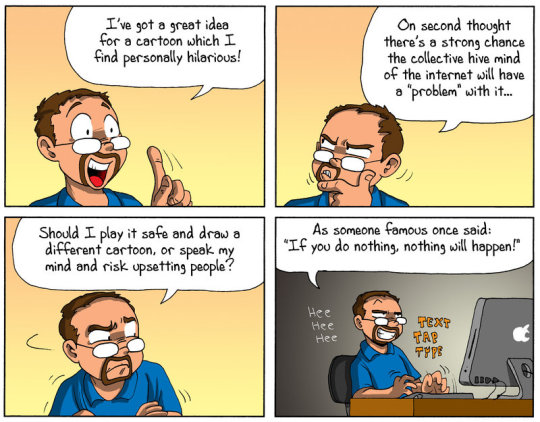
And as someone else once said: Don’t play with fire if you can’t deal with the heat, BLOCK-son!
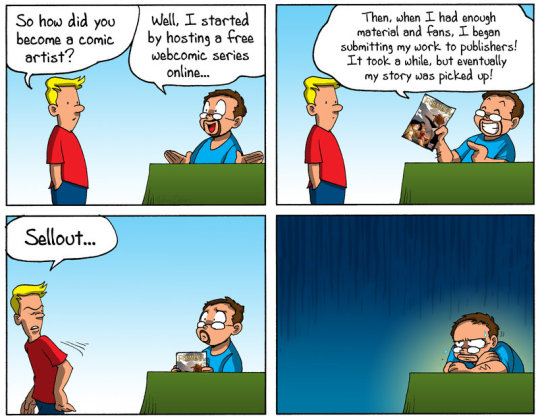
This is not how I perceived your shit over the years. See, on one hand it is true that Alex ze Pirate e.g. has its own webpage to read the comic for free. HOWEVER most of his comics Dobson would hide from the start behind a paywall. The idea being that he would e.g. put a small reading sample of 10-15 pages up somewhere and then expect people to buy his comic for full price to get the rest. And you know, if you are e.g. a professionally published writer, that is fine. But when your average art output looks like THIS
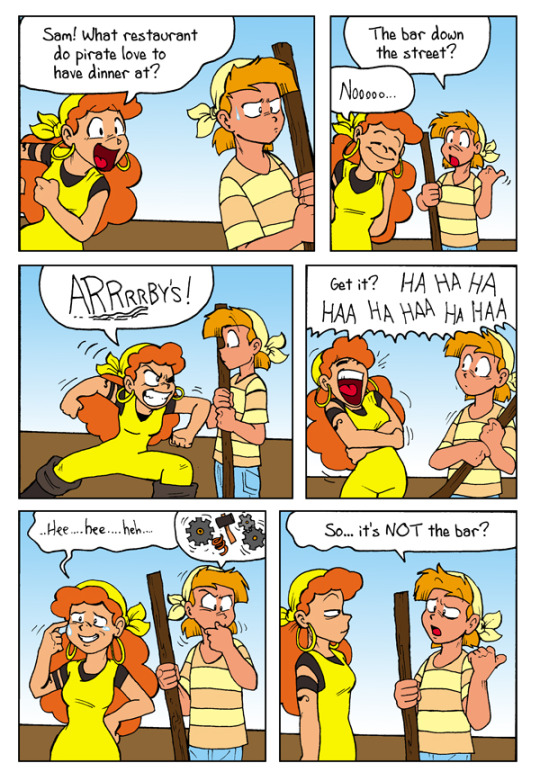
And you expect people to pay more than 10 dollars for something that is only around 70 pages long while most people can get 200+ pages for the same amount of money that look like this…

You can frankly go and screw yourself.
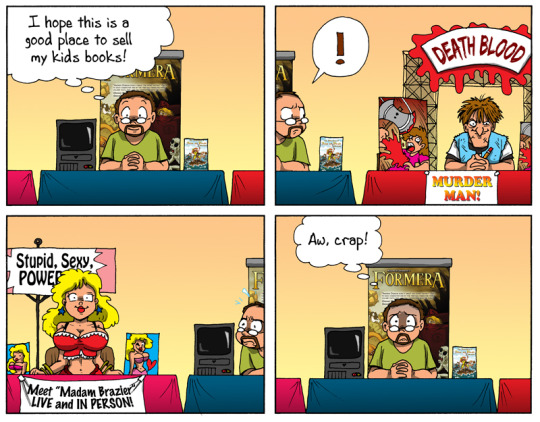
On one hand I get that the joke is meant to be, that as an independent content creator you may find yourself in a weird spot where your “child friendly” work may be put in a palace between edgier stuff other creators sell at conventions. On the other hand, I find it rather insulting in hindsight, that self declared feminist Andrew Dobson portrays such competition as either psychopathic murderers or stereotypical cartoon bimbos. If modern day Dobson saw the same strip by any other person, he would be insulted on behalf of the female that she is portrayed as a bimbo, when she could also be a very smart and attractive woman who knows how to tell brave and sexy stories.
Also, I have read your “child friendly” stuff, Dobson. I would call Atea or Alex abusive bitches who like to bully orphans but child friendly? Not to forget that your work is so basic and shallow in depth, it’s like the someone tried to create a chimera out of some of the worst traits associated with Dora the Explorer, 80s toodler cartoons and the Fairly Oddparents.
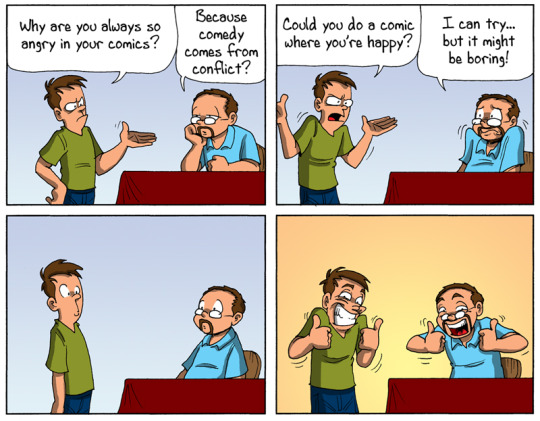
I frankly hate this theory on comedy. It is true, a lot of comedy can be deprived from conflict, misunderstandings etc. Looney Tunes, Tom and Jerry and other cartoons as well as screwball comedies such as Rat Race can depend on it. Heck, one of my favorite comedians of all time is Christopher Titus, who based his entire career on the misery and absurdity of his life.
But comedy is not just defined by misery and conflict.
There are for example also the following theories when it comes to comedy…
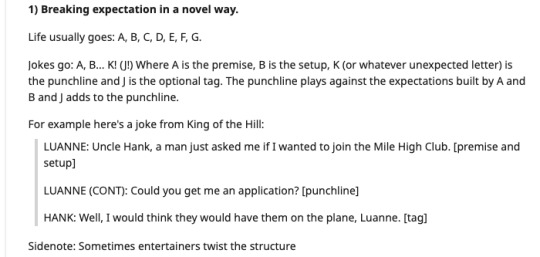

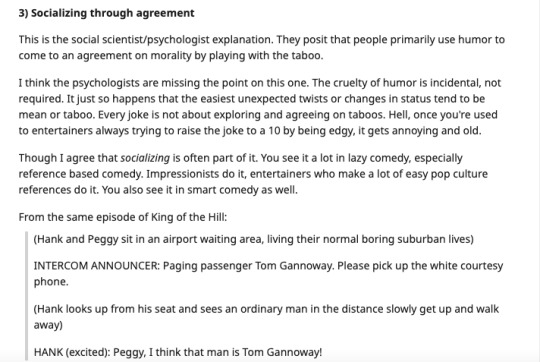
And to get back e.g. to Titus, yes, he has build a lot of his comedy on the bad stuff that happened in his life. But he is also someone who in his comedy has build a lot of punchlines on the absurdity of certain situations he has been in life but which in a way have enriched his life positively.
What I am trying to say is, comedy (and entertainment in that regard) does not just have to be defined by misery. And all things considered Dobson, you could have really tried to also just make comics wherein either you or your characters are just happy with their situation in life.
For example, this page from an Owl House fancomic?
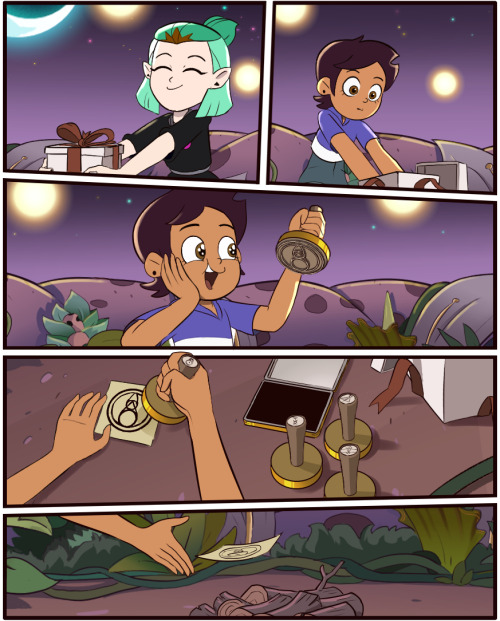
I think it holds more entertainment value than your “joke” right here, despite not even telling a joke.
Simply because as a page overall, it tries to convey a positive emotion. Which is more than I can say about the strip.

Because of a lack of different level of thickness regarding your lines, which would trick people into perceiving depth, the fact that the fill bucket and shade layers can only do so much to cover for the rather monochromatic dull nature of your comic, the fact that your characters are not really all that complex and look rather simplicstic even compared to stuff from a comic like this…
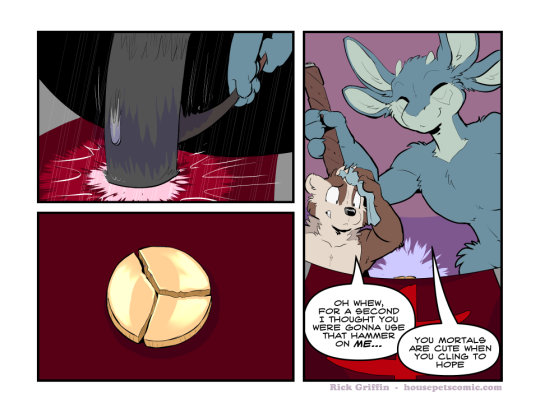
And that is just coming from the top of my head as someone who never studied art. If any reader has something to add, I am willing to listen
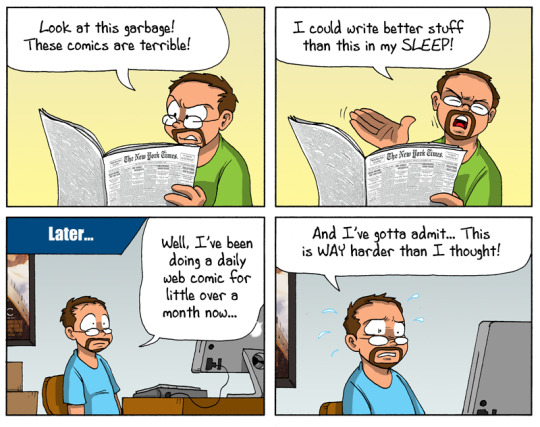
And considering you could in later years never keep up to any release schedule, which among other things resulted in only three SYAC strips in total being released in 2016, I say go fuck yourself. Not to forget that even some of the worst newspaper comic strips out there tend to actually find a decent following and good jokes eventually, otherwise they would not manage to stay popular for years, if not even decades.
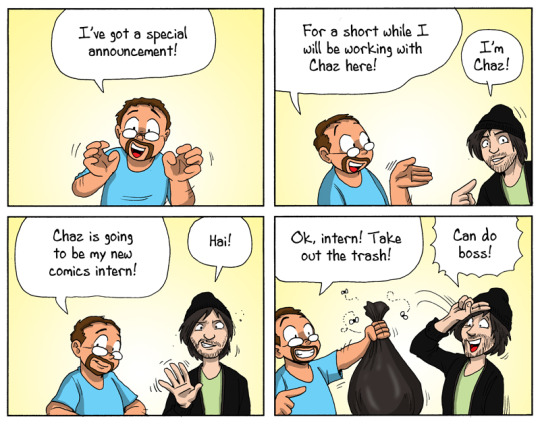
As someone who has worked internships a lot in life, I just want to say fuck you in all our names. Glad to see you having just as much respect for interns than any other scumbag on the planet. Probably even less respect, cause you know, in some places interns tend to get paid.
Also, there is supposedly an entire real world story going on about Dobson having worked at his former university at the time the comic came out and Chaz is based on a fellow intern.
Things are unfortunately rather vague in that regard and only hold up by demonstrative evidence such as the name of Chaz showing up in certain pages of the university and Dobson’s internship being mentioned somewhere.
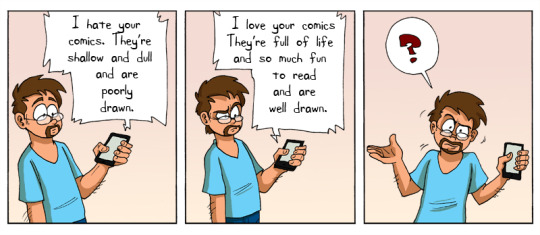
Well, would you look at that: People have different opinions on your stuff.
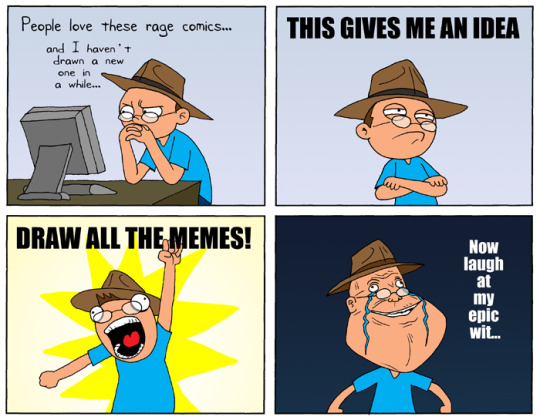
There are ways to draw memes funny and then there are ways to fail at them

You failed.
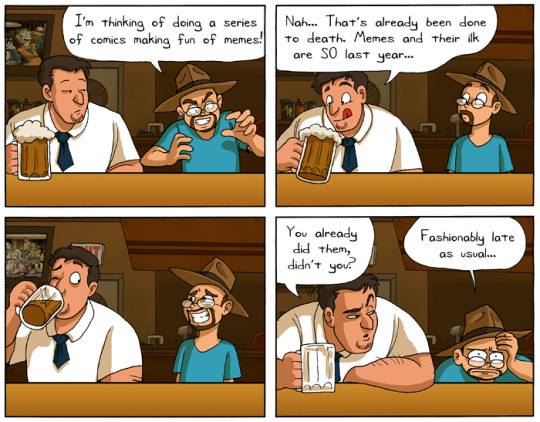
Funnily enough, that comic rings a lot truer to text than you expect. Considering how Dobson would often emulate certain aesthetics in his comics of shows that were rather passee by the time he published his stuff, plus how he will obsess over certain trends and games for years to come (like Skyrim or his Quiet Hate Boner) while also being unaware about current trends (how do you e.g. not have heard of My Hero Academia by 2018 at least once by accident?) Dobson has always been kinda late to the party. Missing the “zeitgeist” of nerd culture and as such never quite finding an audience.
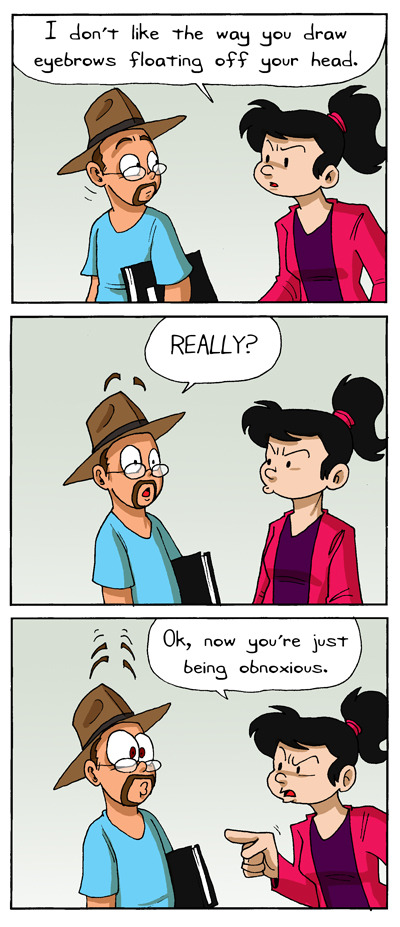
Yeah, what Pam says. Not helped by the fact that yes, the floating eyebrows are real. Look at some earlier sketches or “professionally published” comics by his and you will see that each time characters get excited, their eyebrows will suddenly split into sets of three and float higher than Pennywise’s victims.
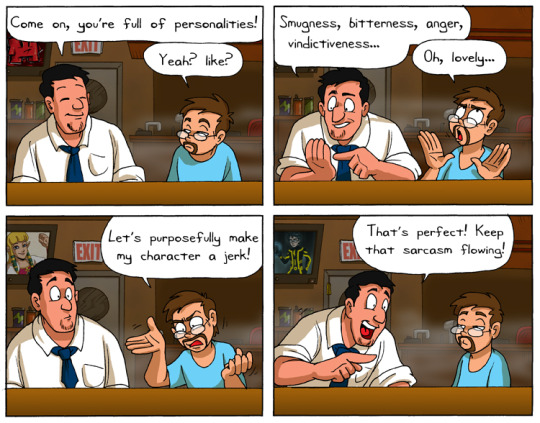
Ironically, that fits real life Dobson at the time and later on even more so than this comic version did. Sorry, but what am I supposed to call a person who has an hate boner on anime for years for superfluous reasons, made Danny and Spot a “gaming webcomic” deliberately to piss on non Nintendo fans and has admitted in some by now deleted youtube video, that he kept a list of usernames from an old forum just to remember even years later the people that were mean to him online?
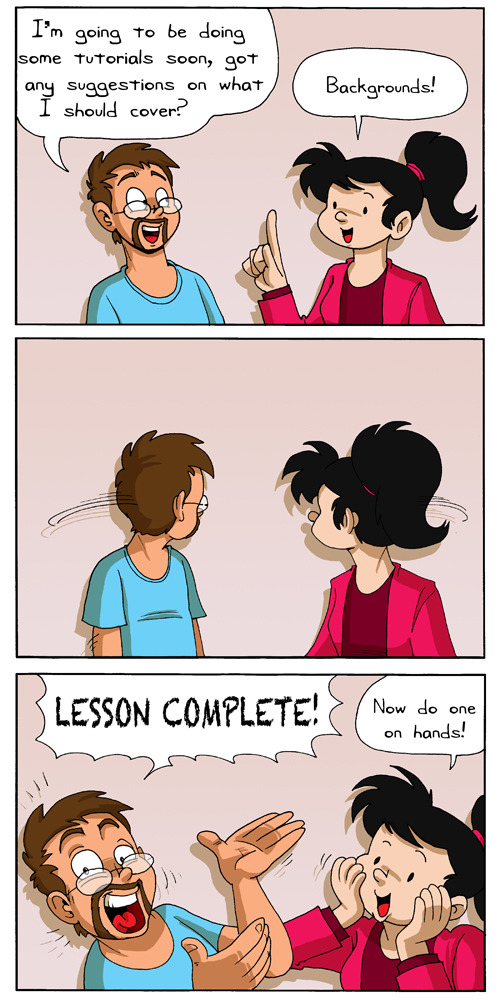
Fuck both of you. I do not expect the Sixtin Chapel in the background, but something to filll up the empty space behind you is at times needed.
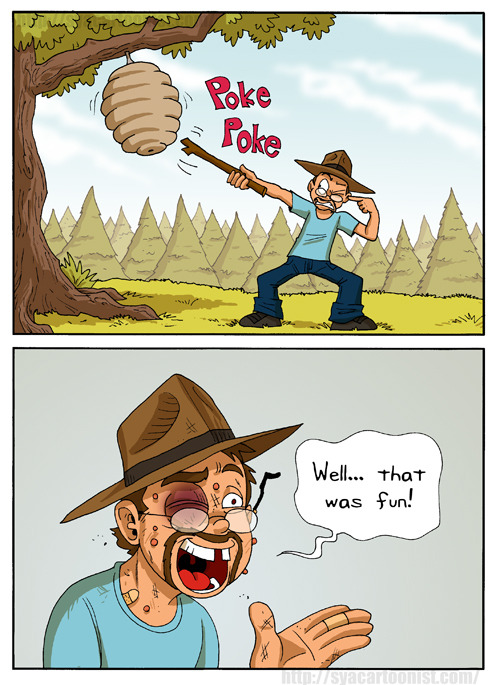
The comic here is actually called politics.
… ironic how things changed once a certain reality show host turned president.
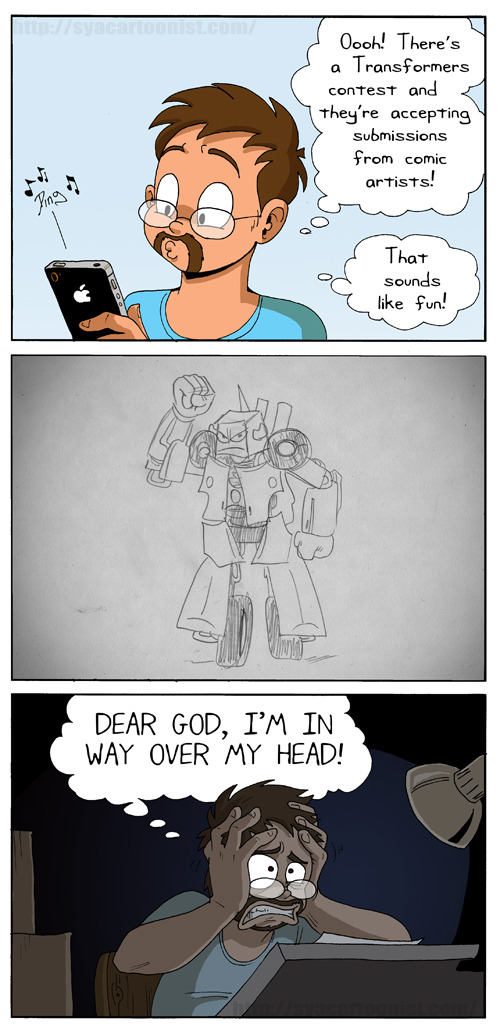
Jesus Christ. I am not even that much of a Transformers fan (Prime fan for life however) but even I know that this is not supposed to be what you design the head of a Transformer like. Not even if they ever produce the Transformers equivalent of Teen Titans Go.

Too bad you still can’t stand the heat, otherwise you wouldn’t have completely disappeared last year.
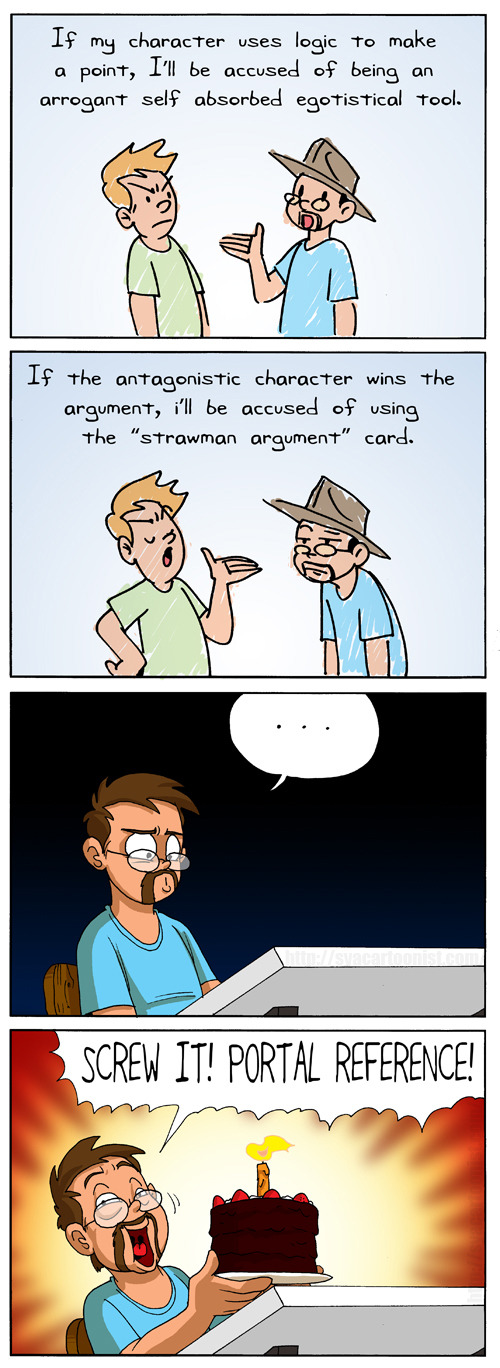
When you know you are in a no win situation, and still manage to choose an even dumber option to escape. I really don’t get it. I just think the Portal reference makes the comic dated and Dobsn’s attempt at a smug face looks so stupid. Like his cheeks are falling in and his mouth is about ready to get raped by a garden hose or something.
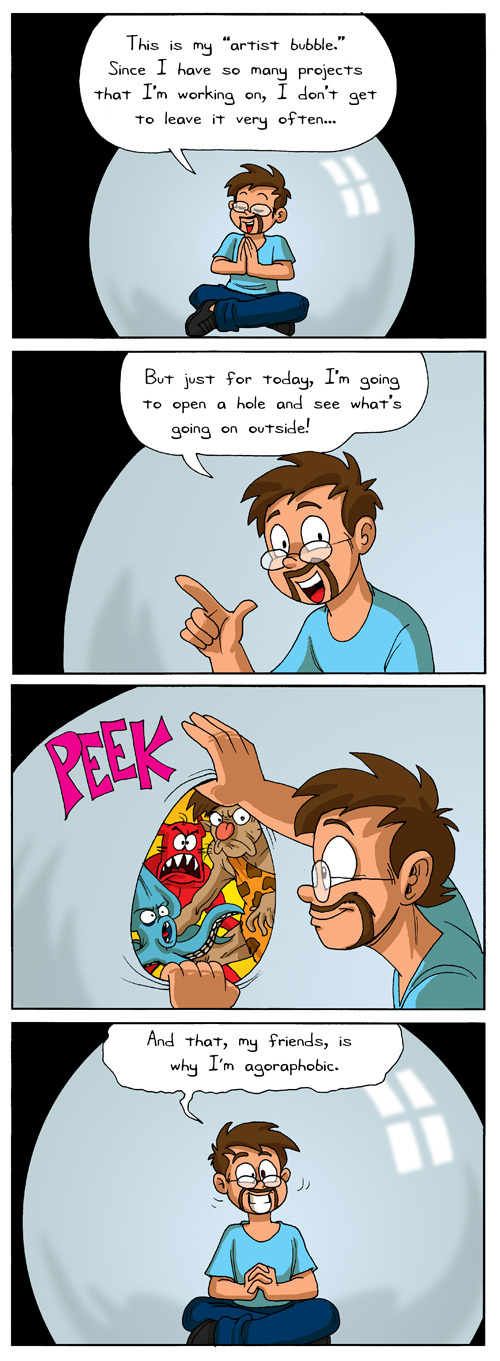
Yeah, considering Dobson’s later constant need for safe spaces and to be in control of a situation and the narrative, which led to so many blocks over the years… if you know anything about Dobson, how this comic becomes harsher in hindsight is rather self explanatory. I just want to say one thing: There is a difference between genuine agoraphobia and just wanting to be by yourself. And I think Dobson just prefers the later on average. Which is okay, but humans still need to interact with other human beings in one form or another, even just for the sake of keeping their mental health stable. Why do you think are so many people getting depressed in times of covid lockdowns, despite many having all sorts of technical gimmicks at their disposal to at least keep boredom at bay?
And by putting himself into a bubble like that, I think Dobson has deprived himself of some of the most basic human interaction, which was likely a severe factor in his mental degeneration over the last years.
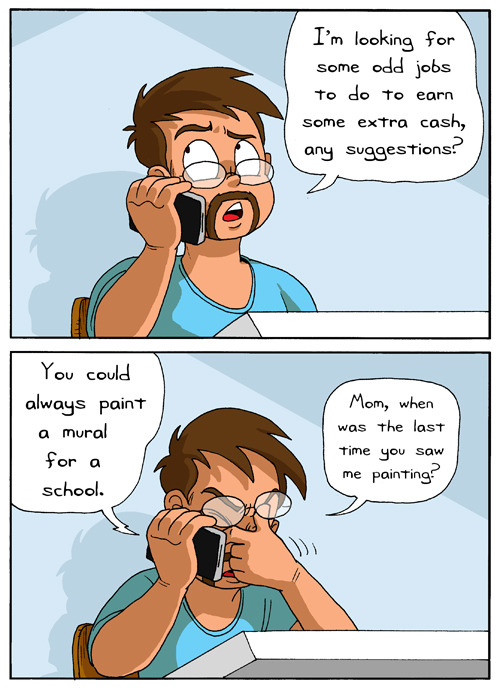
It is still a valid suggestion! Just draw some cartoon characters or a nice fantasy scenario on a mural and earn yourself some bucks. Just be sure they are not by Disney or the Mouse will tear down the school!

… Just google up the words Andrew Dobson and Samus Aran commission by ED and you will see how this comic just further shows how much Dobson seems to actually be proud of being an unproductive asshole.
And by the way, I know that any form of artistic work takes time. Just writing these review posts takes a lot of time for me. But that doesn’t change the fact that people should post and create stuff in a timely fashion, especially when there are e.g. deadlines to hold up too. And by the way, Sloth’s don’t have fingers, they have claws!
And that is it.
Sorry if I missed anything folks, but I just saw how many pages in word this is already filling up, so I call quits for this part here right now. I think I made my point about how Dobson trying to badly deflect arguments people may make against his art and work ethics via jokes clear enough, while also showing some posts that are either harsher or hilarious in hindsight.
Next time we will however address one certain issue about our main character, that has been not directly addressed here. In the meantime, have a little fun video that shows hopefully how entertainment and a certain amount of comedy can be gained NOT via misery.
youtube
#adobsoncomic#Andrew Dobson#Tom Preston#comic#webcomics#syac#so...you are a cartoonist#review#master review
63 notes
·
View notes
Text
alright, so, i wanted to make one post about the cat person thing and be done with it forever, but my thoughts about it have been ping-ponging for the entire 7 hours of my shift because i tend to get lost in my own thoughts when i’m on service bar. and i need to vocalize or i will go crazier than i already am. so, let’s see, how should i condense a night’s worth of stream-of-consciousness into something vaguely resembling a post with a point? well, i don’t know if i can do that succinctly, so i’m shoving my best attempts under a cut.
so, the cat person story draws pretty heavily on these aesthetics that we’ve come to associate very heavily with nerdy misogynists. he’s the fedora tipper. he’s the brony with the friend zone complex. he’s coded in the way so that as a reader, it should come as no surprise that he’s the asshole, delusionally believing he’s a “nice guy,” and would call a woman a “whore” for rejecting him. but, as it turns out, the real robert in this story had a completely normal relationship with this woman who was several years his junior, and this toxic power dynamic thing is something kristen roupenian extrapolated from this guy’s instagram upon noticing he was a geeky dude who was previously dating a woman younger than him. the man who fit so neatly into the stereotype of how terrible men look, crammed into a story where he behaves terribly that’s meant to be cathartic for women to read about, was never a terrible man by any metric.
the reality behind the story almost feels like this bizarre, meta-textual commentary about how we all use one another in varying ways. or how we all fall into this trap of making these strange assumptions about other people based on something we’re projecting. or how we really have no way of knowing what the people around us are thinking. what bothered me the most when i read it was how emotionally difficult it was for the author feeling almost compelled to re-evaluate a relationship she remembered relatively fondly because it had been manipulated to fit this narrative of abusive power dynamics that had been foisted upon it with the basis of, well, nothing grounded in reality.
i wrote earlier about how my reaction to cat person was, and always has been, one of frustration from hearing female friends tell me that same story over and over, and getting irritated with them for repeatedly sleeping with men they had trouble assessing and being shocked every time when the bad signals coagulated into a clot of sheer disgust during sex. how i always wanted to grab them by the strings of their hoodies and yell “why are you so diametrically opposed to trusting your goddamn instincts? how have you not figured out that this inevitable result of hopping into bed with someone who’s making you uncomfortable?” knowing full well that i couldn’t convince them of this if they convinced themselves. relating not to margot, but a hypothetical friend that margot might have shared this story with. even that as an aside, there was this nebulous thing about it that bugged me, more that it echoing a story i was beyond sick of hearing, more than it’s shameless deployment of the m’lady stock character, more than reading it as someone who had been celibate for a year and not connecting with it as someone probably outside the intended audience. something about it just... picked at me. but i never thought too seriously about it. i ignored the annoying twitter discourse about it and didn’t find it compelling enough to actively hate so i basically just forgot about it
when i reread it this morning, my mind immediately went to thomas and milan (who is nb, but this example still works imo). they’re probably the closest thing to CatPerson_irl that I’ll ever encounter in my life. i used to work with thomas at b&b, just a profoundly horrible character from every angle. i’ve never met someone in my life who was easier to dislike. he was this 39 year old divorcee (though he looked considerably younger) who couldn’t go a day without using his ex as a punchline. his broader sense of humor came off like he’d stolen a master list of rejected jokes from South Park and married them with boomer comics. he vocally loved ben shapiro and pumping and dumping significantly younger women who weren’t aware of his geriatric status. milan, a 22 year old bar regular that I later befriended, was one of them. incidentally, milan is the same age that I was when I read that short story for the first time.
our mutual friends found it baffling that milan still spoke to him after admittedly feeling used and didn’t avoid the bar like the plague. especially thomas of all people, someone who didn’t even have enough self-awareness to hide his misogynistic ways and seemed to view everything with a vagina as a potential sexual conquest – myself included. we theorized that he had turned to pickup artistry after his divorce and we would all mock him relentlessly for it. but never did this in front of milan, who still felt some strange urge to defend him, even though they were in a relationship with someone else now and had no reason to do this.
the last thing on earth i want to do is concede that something as rotten as thomas could have anything resembling a soul, or depth, or charm, or goodness. but the more i think about it, the more i realize that i’ve had relationships of all flavors that have involved imbalanced power dynamics, and frankly, the jury’s still out on how i feel about them. i mentioned that part of my reason for revisiting it was seeing how i reacted to it in my post-andrew world, and i want to return to that thought.
some of you may remember the infamous story where andrew was drunk very early in the day. i was sitting with him on my couch and babysitting him, and he began getting very handsy with me. i told him that i was uncomfortable and to stop, so proceeded to undress before immediately losing consciousness and falling asleep on the couch. it was objectively not good, and while i struggled to process this through the sheer absurdity of it all, it was one of many incidents related to his alcoholism that would eventually lead to me terminating that relationship. but in spite of that, it’s hard for me to condemn him as a bad person entirely. he could be, it’s not really my place to weigh in on it. i look back on him and i feel a lot of good things, even with the awareness that he was a mean drunk who would frequently behave in strange, irrational ways in his inebriation. even if i could come to a conclusion, i don’t really know what that begets. i guess i’d be angrier at him, maybe, but i can’t say that it’s a useful thing to feel about something that happened years ago.
what really doesn’t make sense is how i feel angrier towards nikki, someone i confided in about this happening, who later forwarded the information i’d told her to this local abuser watch women’s group, saying that he tried to rape me. i was furious, and given a long list of extremely bizarre behavior, a lot of which involved removing most or all of his clothing before doing something strange, it’s hard to say that’s what even happened. it was a shameful moment for me, shameful that i didn’t see it as something that would indicate his future behavior, shameful that this information was being disseminated to people who knew we were together and knew we broke up. and i was angry at her for a long time for it, even if that’s not fair. and there are plenty of people who have done worse things to me than either of them, less legally defined as something like attempted rape (maybe?) and more vindictive than not being a friend to me in the way i need it, and it’s just shit i sit with and have this whole oil smear of complicated, contradictory, and not entirely rational feelings towards. and i feel sometimes that there’s this thing that happens in feminist or women’s spaces where it’s frowned upon to acknowledge how heavy this kind of confusion can be.
the “whore” at the end of cat person was meant to elicit a specific response, this kind of catharsis for a reader who saw it coming through it’s shameless m’lady stock character employment and feels validated through seeing it coming. this is what being a woman is. this is what navigating a dating pool in a world full of horrible men is. it shatters any lingering ambiguity or confusion that often comes with the territory of wondering if the revulsion is justified or just a mismatch in chemistry, or misreading of a room, and jettisons the idea that it could ever be more complicated than that. i guess that’s always what put me off about it. and i feel like that fictional story, juxtaposed against a real one it’s based on about unanswered questions that we won’t ever fully be able to hash out... something about that will always be more real to me.
#i wanna post this to gp too because i think it's Good Shit#but i need to edit out the names and identifying details obviously
1 note
·
View note
Note
If you don't mind, can we have some Kleinphy headcanons? Some fluff maybe?
YESS DEFINITELY!!
♤Connor is a sucker for cheesy things and Jared is basically the king of cheesy, so he does all the stereotypical giving his boyfriend roses and call him sickeningly adorable pet names type things. Connor is absolutely swooned.
♤Connor isn't a huge gamer but when Jared introduces him to more video games, connor's hooked. Jared let him burrow Detroit Become Human and connor loved it so much that he wouldn't stop talking about it for weeks. Jared didn't mind, it was good to see his boyfriend so geeky about a dumb game about androids, he could listen to him talk about it all day
♤Jared is fat and is proud if it (most of the time), if he ever feels insecure about his weight, Connor is there to give him smooches and tell him that he's perfect the way he is and anyone who thinks otherwise can kick rocks <<33
♤Jared HATES valentines day because of all the weirdos making out in the hallway but when it comes to Valentine's day with Connor?? Dude brings him chocolates and a teddy and of course a dandelion. Then tells Connor to meet him after school so that they can do all the things Jared planned (if he's not too busy of course). They end up having a really good time, Connor has never felt so loved in his life and he's honestly so grateful to have jared that he can't even put it into words
♤Connor always comes to Jared's house at ungodly hours of the morning and he's usually awake so connor comes unannounced. Either he, uses the key, texts jared, or throws stones at his boyfriend's window. When let inside, Connor takes off his shoes and jacket and climbs into bed with jared, putting his head next to or on Jared's chest. It's really peaceful and Connor ends up sleeping peaceful.
♤Connor thinks jared is so cute that calling him jarebear is very appropriate. Jared pretends that it's icky but he actually likes it more than he probably should tbh
♤Jared gives no fucks that he's dating Connor Murphy now, if he hears someone talking shit about connor, he won't hesitate, bitch, he won't let anyone talk about connor like that
♤Jared actually apologized for calling connor a school shooter after Connor runs out of the computer lab, they just happen to bump into each other. Initially, Connor yelled at Jared but was taken aback when Kleinman said "I'm sorry". Connor called his bluff and said that he didn't mean it but Jared said that he did and that he'd prove It by sitting with connor at lunch tomorrow.
•Connor, instead of doing the deed, actually shows up at school and low and behold, Jared actually sits with him. The rest, is history.
♤Connor was the first to say "I really like you" and Jared wasn't expecting it but he really liked connor too. Connor, doesn't go for the kiss but instead, grabs Jared's hand and ask him if he could kiss him. Jared agrees and they smooch, they smooch for a long time and when they pull away, they make it official. Then they kiss again
♤Jared and Connor fuck with each other but they KNOW what is/isn't going to far. Whenever they slip up, the make it up to the other and apology, no buts about it.
♤Jared always offers connor a bite of his food because he knows connor forgets to eat and he wants him to feel good. Plus he'd feel like a dick kinda if he didn't.
♤Connor always says good night my love and good morning my love to Jared, through texts and in person. Just to make sure jared starts and ends his day knowing that connor loves him
♤Connor likes to carry their backpacks both to take the ease off of Jared and his back or because it makes connor feel kinda s trongk
♤Jared loves to slow dance in the kitchen with connor!! It's one if his favorite things, being close to the boy that he loves while also holding his hands and dancing?? Jared absolutely stans
♤Jared got connor a alot of plushies/teddies over the past few months and every single one of them was choosing specifically cus jared wanted the gifts to have meaning and for them to be extra special
25 notes
·
View notes
Text
This is going to sound like a ridiculous question but it’s actually important research: which punk subcultures/subgenres would you assign to which characters from Henry VI Part 3? Actually bonus points if you can split the Yorks and Lancasters up by some theme. Now I realize that if you're following me, you probably know that play extremely well but don't know much about punk subgenres, so here's a couple to get you started, though you could probably also go to the website yourscenesucks:
Street Punk:

I mean this is what you think of when you think punk fashion. In general this sort of thing does lean left and is about rebellion/being an outcast and tends to be pretty working class, though lyrics are also often about like, getting drunk in an alley and getting into fights with cops.
Hardcore:

Hardcore dudes are legit tough. Don't mess with them.
Crust punk/folk punk probably belongs here too honestly:

Crust punks are...well, it's called crust for a reason. The stereotype is someone who squats in abandoned buildings and hops trains. Kind of like the hippies of the punk world I guess? Except angry and drunk. Crust punk as a genre is very close to grindcore. They did go off with crust pants though.
Psychobilly:
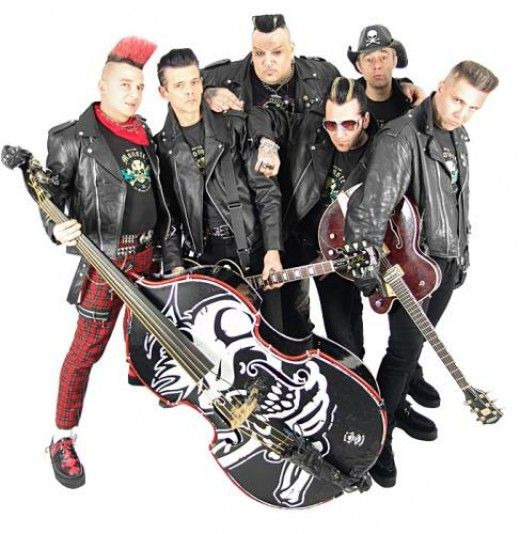
So psychobilly fashion is basically like 50s greaser but make it spooky and a little punk. Work shirts are definitely a thing too.
Ska:

Now personally I love ska, but it IS seen as kind of corny and nerdy and like, too wholesome and not edgy enough. In the 90s it was maybe a little bit a genre for geeky band kids who wanted to play rock. It's associate with two looks really, the Hawaiian shirt look seen above and in the 70s and 80s, the Two Tone/Mod suit:

Honorable mention to pop punk and emo:


Of course, feel free to suggest your own!
0 notes
Text
The Other Day at Hot Topic: Vanitas
Lex and Roxas make their way to the back room together, one clocking in and the other clocking out. The store has a new shipment in, and the entire space is packed with towers of white boxes that need to be processed. As Roxas types thirteens into the time clock, Lex pokes around through the maze of boxes and half-filled rolling garment racks.
“Aqua?”
“Right here,” calls a pleasant female voice, and as Roxas glances over, he sees a pale hand with long black nails poke out from the clutter.
“I have to be going,” Lex calls, “but first, I’d like you to meet Roxas. He’s new and... could use some guidance.”
And doesn’t know what the hell he’s doing, is how Roxas might have phrased it, but this seems nicer.
“Sure! Hang on.” The hand tugs aside a clothing rack and is soon followed by a young woman with a bob of blue hair a few shades darker than Saïx’s. She’s wearing a short, cotton candy pink dress with a flare skirt under a cropped, studded black leather jacket. It’s all very Sandy at the end of Grease, but she’s owning it.
Studded leather jackets seem to be standard issue dress code here. Roxas wonders if his went the way of his name tag.
Lex introduces them, and Roxas reflects on what Axel told him about Aqua. Kick-ass Mom Friend. He sees the ‘kick-ass’ part clear as day. She’s around 5’10”, and black ballet flats or no, the set of her shoulders and the dark, smoky grays of her make-up read ‘don’t fuck with me.’ Like she could knock you on your back mid-cartwheel and not smear her lipstick.
She certainly doesn’t seem like your stereotypical Mom Friend. That is until the moment she opens her mouth. A million questions exit, her enthusiasm alarmingly genuine: where’s he from and what’s his major and is he seeing any nice young men and is he nervous to be starting a new job?
Roxas answers as best he can. Grew up on the islands. At school on the mainland: Twilight Tech. One more semester left in a Communications major, hoping to go into radio or podcasting, but open to other adventures. Wants to travel. Single. Or as Sora would say a ‘single Pringle.’ Oh god, don’t tell Sora I’m quoting him. Younger. He’s alright, just a bit much sometimes. Not nervous but definitely confused. Are we legally allowed to sell both Marvel and DC? Do people actually wear Justin Bieber t-shirts? For real, what is Hot Cash?
He realizes with a funny pang that none of these get-to-know-you questions had cropped up the other day with Axel. It had been like they were already past that when they hadn’t even gotten to it. Maybe it’s always that way when you click with somebody.
Rather than answer his questions, Aqua laughs and waves him off. “Can you take the floor and the register for a sec, Roxas? I’m almost finished loading this and Lex is probably out there waiting.”
Roxas nods, not bothering to check if Aqua can see him from where she is, and heads out to the floor. He waves as Lex goes and its returned with a genuine, if tiny, smile. Progress.
Roxas has only just stepped behind the register and slipped on Cloud’s lanyard when someone new walks in.
The guy appears to be about Sora’s height and age: short, maybe nineteen. His hair’s a nest of black spikes that look like they haven’t seen a comb in several weeks. Actually, maybe that’s what reminds him of Sora.
“Hello!” Roxas calls out, because it seems like the thing to do.
The guy ignores him, which, okay, fair—retail—but continues to approach. He wears a navy blazer with a golden crest on the breast pocket like he attends boarding school, and he wears a scowl like he just got kicked out of it. A pair of expensive white headphones stick out between tufts of hair as if in apology for his unresponsiveness.
“Can I help you with anything, man?” Roxas tries again, louder, and said young man stops for a second, brows rising before continuing his path, past the register, and then slipping behind it and sliding in right next to Roxas.
Roxas backs off a step in surprise, and the guy smirks, reaching for a lower shelf to grab his lanyard from atop a box of, well, Roxas has no idea, obviously. It’s only his second day.
“Hey, I’m Roxas.” Roxas gestures to his chest to make it clear he’s communicating. It feels very “I-Tarzan. You-Jane,” but it gets the job done.
The other guy raises an eyebrow and dangles the nametag at the end of his lanyard up a bit, not bothering to slide off his headphones. Then he turns on a quilted black combat boot and struts off. Roxas makes out the strange jumble of letters at the last second.
Vanitas.
The guy who had bailed on his shift last time and left Roxas for dead.
Charming.
Roxas directs a pair of lost looking tourists in punk clothes and loose Hawaiian shirts toward the food court and retrieves a handful of mini buttons from the floor where it appears as though someone had vindictively flung them at a cashier. He’s returning them to their display box in front of the registers when Vanitas strides out, headphones still on, pulling Aqua behind him by the sleeve. She’s hauling a large, white cardboard box of accessories in her free arm.
Vanitas gestures to Roxas with a thumb, and Aqua raises a blue brow. He gestures again with both hands and Aqua sighs, tugging down Vanitas’ headphones. His facial reaction is more like she’s pantsed him, but she appears unimpressed.
Roxas thinks he hears Brendon Urie crooning faintly from said headphones, which he gets a kick out of, if only because Panic! at the Disco is already playing on the store’s overhead speakers.
It’s like Vanitas’ mouth has been switched on, and he glares up at Aqua, not without fondness. “Why’re there so many of us?” He gazes at Roxas again, up and down, as if taking his measurements. “Did Saïx finally lose his shit and decide to go all Hunger Games on our asses? Because I’ll be real,” he glances back to Aqua with a sharp grin, “I’ve been waiting for it since day one.”
Roxas noisily drops the last few buttons back into the bin and chokes down a huff of laughter. He hasn’t known Saïx long, but with how high-strung he is, it’s easy to picture those strings snapping.
Aqua rakes fingers down her face, shakes her head. “Vanitas, for God’s sake.”
“Hey, my money’s on you, Aqua,” Vanitas glances down at his phone to dismiss his music, though “Let’s Kill Tonight” feels strangely timely. “Larxene’s a scrappy little B witch, but Aqua’s got a dark side,” he continues casually, sliding his phone to his back pocket.
Roxas raises his brows, wondering if it might be true, considering she appears to be friends with Vanitas, who appears to be no ray of sunshine himself. Both turn to Aqua, who’s digging through the accessories, trying to extract one scarf without sending half the box tumbling.
“I say we team up,” Vanitas proposes, twirling his lanyard around his finger like he’s not alluding to Roxas’ dystopian murder.
Aqua rolls her eyes and refuses to laugh, propping the box on her hip and angling herself between the guys as Roxas crosses the checkout line space to meet them, clutching at his own lanyard.
“There are two of us because of the holidays and three because he’s a new hire and still learning the ropes.” Aqua hands a silver and green striped scarf off to Vanitas and pushes him back the step he tries to take, staving off his smirk. “Not because Saïx is hoping we’ll do him a favor and kill each other.”
“Yeah,” Roxas’ brows rise, darkly amused, in spite of himself, “imagine all the extra paperwork that would be.”
Aqua scoffs with mild disapproval, and Vanitas misses the remark entirely as he wraps the scarf around his own throat, eyebrows furrowing. He watches Aqua hand Roxas a winter hat with Pikachu ears.
“Jesus, how many spikey haired blondes do we need?”
“Prompto left, Cloud barely subs any more, we have to have one,” Aqua teases, lip quirking up as she nudges Vanitas’ shoulder.
Vanitas huffs exaggeratedly and steps closer to the Harry Potter merch. “Fuck that.” He glances at Roxas again, like he’s trying to gauge his reaction, so Roxas keeps it neutral. “I’m not learning your name.”
Roxas shrugs, deepening Vanitas’ scowl and efficiently killing all connections in his mind between the dude and Sora.
Axel’d said Saïx wanted desperately to fire Vanitas. Roxas suddenly has more sympathy for his uptight boss.
Aqua eyes Roxas thoughtfully, like she can sense his inner unease. He doesn’t want to be making any more waves here. He needs this job—needs money. To pay off his rent—to pay back Seifer.
“Ignore him.” She piles more warm, geeky hats in Roxas’ arms. “He has insomnia and sometimes it puts him in a mood.”
“All the fucking time,” Vanitas growls in the distance, hidden by the displays.
Aqua tosses a hand up in mild exasperation and offers Roxas a reassuring smile outlined in charcoal lipstick. “We’re happy to have you here, Roxas. Both of us. Really.”
“Um,” Roxas attempts to smile back, resisting all impulses to bitch and argue, repositioning the pile in his arms, and realizing he has no idea where any of it goes, “okay. If you say so.”
11 notes
·
View notes
Text
Urgh I saw a post about how someone headcanoned a character (who I dislike cus he’s a major dick and not the greatest person but that’s just personal opinion) was autistic and it bugged me cus that character is the exact definition of autistic stereotypes and most of those stereotypes are harmful and very inaccurate
Like literally the character in question is robotic (in an emotional way), extremely smart, kinda geeky, etc. it’s not even that the dude’s a dick and said person had the audacity to use that hc that bugs me, it’s the character himself.
#id bring it up to the op of that post but id like to avoid any sort of ‘discourse’ or confrontation rn#theres nothing wrong with having hcs but this one in particular rubs me the wrong way.
0 notes
Text
Floréal - Les Mis Ladies Week
<a short fic. platonic Floréal/Grantaire, focused on her> Floréal. How could Grantaire describe Floréal? She was undefinable. She was peaceful chaos and erratic calm. She was flawed and perfect. She was rainbows in a hurricane. She was the best friend he could ever ask for. Grantaire could still remember the first time they met, clear as day. He was a barista at a coffee shop down the street from his flat, because he couldn't support himself on his art alone yet, and he refused to lean on Joly and Bossuet any longer. The place was called ReJAVAnation (The bad pun was the only reason Grantaire had decided to work there), and the manager (who happened to be his friend Éponine- what a coincidence!) let him hang up a few of his paintings on the walls. His favorite was one right behind the counter, a picture of a forest. He'd painted it with bright, happy colors, but he'd used shadows and faint shapes in the leaves to make it seem somehow dark and dangerous. Or at least he thought so. No one else had commented, so maybe they didn't see the details. Or maybe they didn't care enough to really look at all. That is, until the day a girl with blue and green streaked hair, thick-framed glasses, and a Lord of the Rings sweatshirt sashayed in. She looked like a stereotypical nerd, but she carried herself like a supermodel. Grantaire liked her at once. "What can I get you?" he asked when she reached the front of the line. "Large hot chocolate with caramel," she answered instantly. He grinned. That was an unusual order. "And the name?" "Floréal. F-L-O-R-E-A-L. Accent over the 'e'." This with the air of someone very tired of having her name spelt wrong. While Grantaire prepared the drink, Floréal glanced around the shop. Her eyes landed on the so-often-overlooked painting. "Who made this?" she asked, looking a little taken aback by the work. "Um... I did," Grantaire answered awkwardly. Floréal stared at him for a minute. Then suddenly she snorted with laughter. "Oh, God, who /hurt/ you?!" she giggled. Grantaire's eyebrows drew together. He had no idea what to make of this new development. "Uh, no one... recently, anyway. What, is it that bad?" Floréal snorted again. "It's not /bad/, you idiot, it's incredible! It's just... honestly, what the hell, dude; it's freaky. I feel like something's going to attack me while I'm looking at it!" Grantaire's eyes widened. He couldn't even bring himself to mind being called an idiot. He was too stunned that this girl had actually gotten the point of his picture, seen the hidden darkness in it. Slowly, he began to grin. He opened his mouth to say something- he wasn't sure what- but was interrupted by the loud, pointed cough of another customer. Grantaire blushed and quickly handed Floréal her drink. "Sorry, sorry. I'm coming," he told the newcomer. He glanced back at Floréal, who simply handed him a piece of card paper. "If you wanna talk about how messed up your head is some time, shoot me a text," she said, smirking. Then she turned and left. He looked down and saw it was a business card of sorts. "Floréal Chevalier ~ greatest chick you'll ever be lucky enough to meet ~ bit of a nutcase ~ (410)223-6291" was printed on it in comic sans. Grantaire grinned and pocketed the card before turning to his very agitated customer. It was the start of a long and beautiful friendship. Grantaire could tell dozens of stories about his best friend (his platonic soul mate, as they both agreed), but that was the one he told again and again because it was so purely... her. Floréal was clever and fun and mischievous and confident. She lit up any room she walked into, all the while sharing Grantaire's morbid sense of humor and tendency toward sarcasm. He never felt anything remotely romantic for her- in fact, he was the one to introduce her to his quiet, geeky friend Louison, who soon after became her girlfriend- but he knew he couldn't live without her. Floréal wasn't the kind of person someone stopped loving. Not for a second, not ever.
3 notes
·
View notes
Text
Reading Sterek #17
Everything I read this “week”: February 19 - February 26
Not!Fics/Ficlets/AUs
❤Coffee? by @deleted-scenes 791 G❤
“Coffee?” Derek asks, holding the French press mid-pour.
The dude has a fucking French press, Stiles thinks distantly, still trying to shake himself from his extremely-well-fucked stupor.
❤That’s My Shirt by @nogitsunelichen 887 G❤
“That’s my shirt. So is that…wait?”
D.C. by @haletostilinski 1,033 G
It’s been about a week of driving on the road, and Stiles gets to his place and drops his things off. The rest of his stuff will be delivered in about another week.
AO3 Fics
❤Hug Delivery by @villainny 674 G❤
“Stiles Stilinski?” Stiles looks up, his mouth dropping open when he reaches the pinnacle of stubbled beauty that is the man’s face. “Oh wow,” he says, “wow, I would not have called the leather.”
Like Aunt Millie’s Dogs by theauthor2010 1,107 E
Drabble. Sheriff Stilinski walks in on Derek and Stiles. Only Derek…can’t leave.
Operation: Find Out if Stiles is a Virgin by day 1,238 NR
Stiles doesn't know why the pack thinks he's a virgin. He's really confused. “How many people have you slept with?” Allison, who has been trying to get Scott to breathe this entire time, asks.“Men or women?” Stiles asks and that's apparently not what they were expecting judging by the way they're all choking.
Bedtime Stories by frek / @frek, xKxDx 1,260 G
Derek hasn't been read to since he was young enough to sit on his father's lap.
The Idiot's Guide to Modern Tech by Chioces / @chioces 1,847 G
Five times Derek texts Stiles and the one time he calls.
I Got Mine by milkysterek / @milkysterek 1,940 E
His throat is thick, body tense as he rocks forward against the sink, trying to find some friction against the smooth underbelly of the basin. Nothing feels good, there’s no release and somehow through his lust clogged gullet he manages a whimper, “Please, Alpha.”
Good Idea, Bad Idea by bleep0bleep / @bleep0bleep 1,942 E
“I need to keep my eyes on the road,” Derek says sternly. Stiles unbuckles his seatbelt. “So keep your eyes on the road, then.”
Boys are Dumb but Werewolves are Dumber by frek / @frek 2,234 G
Five times Stiles tries to tell Derek how he felt and the one time he didn’t have to.
❤Quoting Rhett Butler by haleofStilesheart / @hale-of-stiles-heart 2,445 T❤
Stiles has a bad habit of dating complete assholes. Good thing Derek's there to knock some sense into him.
❤Limbo by Inell / @inell 2,550 T❤
Stiles and his team are on an undercover stakeout that’s not going too well. Derek’s using his powers for good, but Stiles knows it’s not the right moment for their relationship to change.
"Poor Derek" by write_light / @write-light 2,968 E
For high-scoring, scholarships-and-a-bright-future Derek Hale, the worst thing that can happen is to stop thinking. Rule-breaking, trouble-on-two-legs Stilinski has exactly that effect on just about everyone.
Plot Twist: Derek's Still a Virgin by coffeeinallcaps / @coffeeinallcaps 3,096 E
“I’m a virgin. Do you need me to spell it out for you? I. Am. A. Virgin. I am a virgin. I, Derek Hale—” “Okay, I get it, I get it,” Stiles says. “I’m just gonna need some time to digest this information, that’s all.”
Ready by ashley_ingenious / @andrwjstn 3,117 E
Derek Hale’s not an idiot, okay. He knew becoming an Alpha wouldn’t prevent him from going into heat. He just thought… he just thought he had more time, because Alpha’s don’t go into heat unless they’re in the presence of their true mate. And that, well, Derek hadn’t been expecting that.
JailBait by TheGirlWhoDancesWithAlphas 3,270 T
Stiles hadn't really expected to wake up from a long night of shipping wars and hardcore pack cuddles to Derek Hale cooking him pancakes. But he also hadn't been under the impression he was stupid enough to forget his own 18th birthday. Or that his dad and Derek were apparently friendly. (also known as the weirdest birthday stiles has ever had)
Like A Virgin; But not. by TheGirlWhoDancesWithAlphas 3,601 T
Stiles totally fit the geeky, virgin until he was 30 stereotype. Except, that he didn't.
❤Fuzzy Logic by Sparseparsley 6,504 E❤
Derek and Stiles switch bodies because of wizard reasons and Stiles just wants to know what that awesome scent is.
Actual Virgin Stiles Stilinski by BriaLlama 7,241
Virgin vir·gin noun 1. a person who has never had sexual intercourse. 2. an unmarried girl or woman. 3. Stiles Stilinski
❤It is so Quite New a Thing by sheafrotherdon 8,713 E❤
In the last, lazy moment before he opens his eyes, Derek realizes something is wrong.
❤Our Puddle is Deceptively Deep by calrissian18 / @wellhalesbells 10,009 E❤
They start out in a literal tree, K-I-S-S-I-N-G.
❤Here's My Hand if You'll Take It (I Can Be That Part of You) by Vendelin / @ljummen 10,740 E❤
When Stiles is away at college, he realises that he’s in love with Derek. He also realises that he doesn’t exactly have the qualities an alpha needs in a mate. Boyfriend. Whatever. So he decides to change, with a little help from Martha Stewart. It’s just that Stiles isn’t all that great when it comes to tending to the betas, baking or cleaning. But maybe he doesn’t have to be.
❤Do You Wish We’d Fall in Love by @sterekwriters 11,028 E❤
“You’re in love with my brother!” Scott accuses - completely out of the blue if you ask Stiles. There is nothing whatsoever that could even explain why this question would cross his best friend’s mind. In the middle of them being Call of Duty no less.
❤Insane Chemistry (with Derek Hale) by theroguesgambit / @halekingsourwolf 13,488 M❤
Derek is the popular, varsity jock, prom king of the school, and Stiles is not going to be the cliche that ends up falling for him. (It’s not a cliche if no one else knows about it, right?)
❤Knot if You Don't Knock by jsea, marguerite_26 / @marguerite26 13,737 E❤
Stiles never expects to present as an omega -- that's something that happens to people like Greenberg, not him. He is so wrong.His life only gets stranger when Derek Hale mistakenly bursts through the door of his exam room during a doctor’s appointment. What happens next is a complicated series of events, including freshly baked cookies, book-carrying and surprise heats.
❤❤Patterns of Intention by drunktuesdays / @drunktuesdays 17,085 E❤❤
Derek looked like the stuff of his deepest fantasies. His shirt was rumpled where Stiles had his hands in it, and he was breathing hard as well, chest heaving. His eyes—his eyes were glazed over and he looked stunned, like he’d been—like Stiles had— “No,” Stiles said, blood draining from his face. The word was croaky and felt like it had to be wrenched out of his chest. “God, no.”
♚The Price by theroguesgambit / @halekingsourwolf 18,452 M♚
Stiles must surrender the most important thing in his life to protect the town… and no one can figure out what it was.
❤❤Drown Me with Kisses by LadySlytherin / @everything-a-wolf-could-want 19,428 E❤❤
When a rusalka in the preserve nearly kills Stiles with a kiss, Stiles is in grave danger any time he’s near a source of water - not just rivers, lakes, and oceans, but pools, bathtubs, the shower, a sink full of water - you put water in it, and it could probably kill Stiles now. Deaton’s advice? Break the rusalka’s magic with a kiss of opposite power - love to beat out death.
Other
Head in the Dark (comic) by @tokume and @cutewolfboys WIP T
The Shopping List by apocryphal / @the-apocrypha
Stiles' shopping list is stolen and modified. Repeatedly. (Very image heavy.)
#this weeks fic rec has been brought to you by halekingsourwolf#fic rec#sterek#sterek fic#rec list#text#eternalsterek#stiles stilinski#derek hale#tw#teen wolf#eternal sterek
237 notes
·
View notes
Text
More Domestic Jazekiel things with Ace!Jake:
They move into Ezekiel’s apartment because Ezekiel took one look at Jake’s place and noped the fuck out wide eyed like he was in a horror movie
Jake is an actual human disaster and every stereotype of a bachelor dude rolled into one human being Ezekiel didn’t think this was possible
Jake may have overcompensated about finally not having to hide his art and poetry geekiness by buying a lot of books.
ALL OF THEM.
There are so many books, why.
The books alone fill up Ezekiel’s apartment
Every time Ezekiel neatly puts them away he comes back to a mess later on because Jake
Ezekiel wants to tell Jake that ebooks exist and are amazing space savers but Jake looks so happy it feels like a sin so Ezekiel sighs and deals with it.
Ezekiel also develops a new reason to hate Flynn because Flynn is a book enabler my god, Ezekiel is running out of space.
Jacob Stone cannot keep house to save his life how did this man even make it to adulthood Ezekiel wonders.
It takes approximately a week of dating for Ezekiel to start calling Jake yeobo and this is how he knew he was deeply and totally fucked
It takes two days of Jake moving in for Ezekiel to start grumbling in Korean to himself about his actual human disaster of a boyfriend while picking up after him.
No but really, Ezekiel Jones is the responsible one in this relationship, how the fuck did this happen
Ezekiel no longer has any white socks because Jacob fucking Stone cannot be trusted with the laundry.
Jacob fucking Stone also cannot be trusted to remember it’s his turn to do the dishes.
Ever
Ezekiel is not even lying about it or exaggerating
like how hard is it Jake we have a dishwasher all you have to do is put them in and turn it on why are you like this
They once left for a mission which turned out long, and Jake assured Ezekiel that yes he did the dishes and they came back to very dirty dishes which had proceeded to grow their own ecosystem
Ezekiel Jones is absolutely powerless when people play with his hair. Jake learned this twenty minutes into their first major fight after getting together and he’s evil and uses it to his full advantage whenever they argue or Ezekiel stays up late at night coding and refusing to come to bed
A list of things Jake Stone actual honest to god cries over:
Byron
Tennyson
Romantic poetry in general
Good analysis of art and artistic movements
Korean soap operas
It takes six months of them living together for Jake to actually share a bath with Ezekiel
It’s not romantic in the least because it promptly devolves into a water fight
Ezekiel constantly steals Jake’s scarves
And Jake’s hoodies
And Jake’s henleys
Actually Ezekiel is just a clothes thief in general. Jake no longer knows which shirt is his or Ezekiel’s any more
#text#jake stone#ezekiel jones#the librarians#jazekiel#otp: drinking dreaming moon#ace!jake#the domestic misadventures of actual human disaster bachelor stereotype ace!jake stone and his long suffering husband ezekiel jones
53 notes
·
View notes
Text
Guys: The perspective from a woman in a STEM career vs other careers
I’m in uni, studying computer engineering, and I swore this is going to be my last year in uni, so I’m taking more than three times my usual amount of subjects per year (not sure yet how I’m going to pass 16 subjects, but I’m old af and tired of being in uni, so I’ll make it happen somehow). Which is relevant for this next story.
I went to do an intensive course last week, and had to share a room with an International Commerce student, a girl in the first years of her career.
So on the fifth and last day of class, after five grueling days of 10-hour classes and with just the final exam to go on the next day, I decided to go for coffee in the cafeteria to relax before starting to study for the exam. I met one of the guys in my team (we were 9 crazy people in that intensive course, 8 guys, and me, the only woman, and had to partner up in groups of 3 for the many, many projects assigned), and asked him if I could sit there and drink my coffee with him. He said yes, which I thought was super nice of him, considering he had a huge ass book that he brought with him to read while having his coffee.
On the table right next to ours was the IC girl with another five girls and two guys cramming like crazy for their exam.
The guy and I got to talking, first about his book, next about other books, then fanfictions, then the new trailer for HTTYD 3, then mangas, then animes, then comics, then video games It was awesome, and nerdy/geeky as all hell (at least from an outside perspective). There were some interests we didn’t share, him fanfictions, me anime, but it was a good talk nonetheless.
I thought nothing of it, it was a normal interaction with one of the guys from my career. I’ve had a lot of those, and will continue to have a lot more.
Then I went back to my room, and was trying to find enough motivation to study some more when the IC girl comes back, and all excited she asks me: “So, I saw you talking with a guy in the cafeteria...” eyebrows waggling.
Me, not understanding how it’s something noteworthy: “yeah, he’s one of the guys from my team”
Her smile grows: “So... how was it?” more eyebrow movement “he’s cute, and you guys seemed to be getting along really well.”
She was so excited I felt a little bit bad dashing her matchmaking dreams, but I politely informed her that he was married (with another woman from our same career), has been for almost two years now -which he had informed me and our other teammate the previous day during dinner, flashing his ring like Beyonce in Put a ring on it, like he hadn’t been proudly wearing it for the past five days-.
She got a little bit confused then, couldn’t quite understand the whole interaction when you took away the supposed flirting that we were doing, and proceeded to change the subject, a bit uncomfortable.
It’s been quite a few days now, and I can’t quite put it out of my head. I’m not sure if I find it funny or a little bit sad.
Now, STEM careers are not very popular for women, but Computer Systems in particular is very much a guys thing still, at least in my uni. The usual ratio is 45 guys to 4 women. No kidding. So from the very first day you just get used to being surrounded, and if you weren’t aware before then (which I was, because I have a brother) then you very quickly realize that guys are not some weird creature, interested in fucking and sports and little else. They are not Dudes who will only talk with women to either ask them for their notes from class or flirt with them and then date them/fuck them/whatever.
If I went into every interaction with a guy in my career thinking that they are flirting with me, things would go very badly, very quickly.
Yeah, I’ve flirted with guys from my career, and I’ve had guys trying to flirt with me. It does happen. (They take rejection like champs, very polite the whole lot of them.)
But not every interaction is flirting.
And I find it sad that at her age she still just didn’t seem to get how our normal -if very excited- chat about our shared interests wasn’t flirting.
Also, thinking further about this, I’ve noticed that mixed groups of friends are a bit of a rare thing in other careers. It’s usually groups of girls and groups of guys, and then couples.
When the IC girl got in, the very first day of class, she got together in a group with four other girls, and only started talking with guys on the fourth day, because they organized a night out to celebrate everyone passing the exam.
The first day of class the only thing I was interested in was finding out who actually got the subject so I could partner up with them to see if I could learn the lessons through sheer osmosis or something (I admit to hating/not understanding that particular subject, hence why I took an intensive course, best to get rid of it quickly than to suffer through a whole semester). Then during the second day, once the terror and anxiety had receded to their normal levels, I noticed that I knew two of the guys from other classes, and I made it a point to talk to them, and then through them to everyone else. By the third day we were all having lunch together, talking shit about the professors and asking what subjects were were taking, etc.
If there had been another woman in that class, my approach would have been exactly the same. I’ve yet to feel the need to form a girl-exclusive group, even in the subjects I took where there were four other women there. Their attitude is exactly the same as mine. It’s actually rare to find two women (or more) in one team for our projects. I’m not sure why, but that happens a lot, especially after second year.
The point of this whole thing is that women don’t always seem to get that guys are people too. They get just as excited about books/movies/series/video games/sports/etc as we do, and gushing about it whether with another guy or a girl is not always flirting. It’s just them being excited and sharing it. Stop expecting them to act a certain way, or to talk about certain stuff. Yeah, there are those who love sports/video games/etc, but stereotyping them hurts your interactions with them. Just get to know them as individuals, like you would another woman.
Something I’ve learned, is that with very little effort, you can find at least ONE interest you have in common with a guy, if not more. Talking with guys just to talk with them is just as valid as talking with a random girl, it doesn’t have to be flirting.
(From work I’ve also learned that guys in particular are more gossipy than women. Women will talk about their families and kids eight times out of ten. Guys will gossip about anything and everything five times out of ten, the rest is a toss up between talk about their families, sports, news, work stuff or other random stuff. Which I find funny as hell. How come no one ever talks about that stereotype?)
#stop stereotyping guys#it's boring af#you are missing out#guys are people too#stereotyping is wrong#I'm also slow as fuck#how come it took me seven years to notice?#STEM FTW#Also#don't get me started on the movement to get more women into STEM#that's just bullshit#women ought to do what they want#if they don't fucking like STEM#stop shoving it down their throats#no one ever gave me a talk about STEM#I just knew I loved computers#it's like being gay#(or demi in my case)#you don't have to be told#you know it deep in your bones
0 notes
Text
Expert: Despite the right’s stereotype of antifascist activists as close-minded thugs or paid protesters, in reality the majority have long been quite geeky, prone to lining their bookshelves with obscure fascist screeds and abstruse historical tomes. This comes with its own problems. Fascism is a multifaceted phenomenon to say the least and different threads can easily preoccupy a researcher their whole life. This has made fascist studies a kaleidoscope of particulars that can be forbidding for newcomers and resists general summary. We are all lucky then that in a moment when suddenly everyone is interested, Alexander Reid Ross has undertaken the herculean task of mapping an overview of fascist historical and ideological currents across a myriad of directions and locales. Ross rose to some anarchist prominence in the process of writing Against The Fascist Creep when AK Press asked him and Joshua Stephens to investigate the South African platformist author Michael Schmidt. Their resulting multi-part report on Schmidt’s hidden nationalist and racist affinities and his surreptitious attempts to slide such into mainstream anarchist theory and practice was initially shocking and contentious to many. While the conclusions of Ross and Stephens were ultimately accepted as unassailable, even largely finally admitted to by Schmidt, the initial pushback they received was intense. Few like to consider a world where political dissembling and conspiratorial misrepresentation are pressing issues in radical theory and communities. Understandably, the instincts of many are to recoil at the thought of investigations into such. How are we to protect ourselves if people can accuse others of believing things secretly?! Almost everyone in our society has had formative experiences with the panic and horror of social circles closing ranks because of unfalsifiable accusations. Regrettably, the instinctive solution of rejecting any and all accusations as “witchhunts” and generally refusing to model any deeper dynamics than people’s face-value proclamations can open the door to far greater damage, creating an environment that not only gives cover to but encourages all manner of surreptitiousness. Such a charged atmosphere around antifascist scholarship can also make it hard to fruitfully discuss points of ideological overlap, weakly defended against entry and egress. When — no matter how nuanced the conversation is broached — all that’s heard is “the nazi stain is upon you!” no one wants to strategize around ways to better resist the nazi creep into their own ranks or ideas. Almost everyone prefers to close ranks against the dastardly accuser… even if closing ranks means happily joining arm-in-arm with the dudes with nazi tattoos. Schmidt was a particularly extreme case because his now discontinued book, Black Flame, had become one of the most treasured political works among anarchists of a red or anti-individualist persuasion — infamous for stripping anarchism of its ethical depth and philosophical diversity, reducing it to merely a particular tradition of working class resistance to capitalism. In retrospect, now that his ulterior motives are universally acknowledged, such a rhetorical move screams of an attempt to defang anarchism against the nationalism and racism Schmidt secretly sought to inject. Yet Schmidt is but one example in a long lineage of attempts by those with fascistic politics to disingenuously infiltrate and co-opt the radical left. Perhaps partially in response to the pushback he received in the Schmidt affair, Ross has studiously worked to strip Against The Fascist Creep down to a “just the facts” approach. This is largely (but not always) successful; in some cases, Ross’s attempts to quickly bridge or bundle the bare atomic facts creates implicit narratives that obscure or misrepresent, and in a few cases he messes up the facts. Against The Fascist Creep is at its best when laying out direct historical sequences. It is at its worst when shoving together an array of associations. When Ross wants to give a quick passing reference to creep in separate movements as vast as libertarianism or transhumanism, he often badly misrepresents things (see the end of this review for some hilarious examples), but in his defense these occasional screw-ups appear to be obvious byproducts of grasping outside focus of his research. The closer Ross sticks to direct branches of fascist thought, the more spot-on and rigorous he is. On the whole, Against The Fascist Creep is an achievement at juggling countless variables or dynamics: a decent and much-needed overview that will hopefully give more substance to the frantic talk of fascism widespread across the left today. Ross’s central thesis — that fascism is in many respects ideologically syncretic and opportunist — should really be undeniable. But much turns on what one moral the reader takes away from this reality. Against The Fascist Creep is, from its very title on, obviously unequivocal in its urge to take the creeping influence of fascism seriously. Yet, as a consequence of Ross’ aspiration towards an uncontroversial “just the facts” approach, analysis past that point is thin. Should we see that creep as a pressing risk to or inherent in any transgression of left and right categories? Are there aspects or subsections of the left or anarchism that are more fertile ground for it? What aspects of fascism are more concerning or inherent? Against The Fascist Creep makes motions towards answering these questions but provides few concrete arguments. Ross admits that the book he ended up writing didn’t match his perspectives and assumptions going in. There are clear signs of narrative tension throughout the book, between sections that opine distinctly in a direction and sections that end up more equivocal on the same subjects. It’s clear that Ross, as a good scholar, was willing to challenge and deviate from his initial biases. Against The Fascist Creep ends up with blame to go around in every direction — rather fair in its assessment that every ideological tendency has its ties to fascism. Hopefully this will challenge readers, but one fears that most will take away what they want to, focusing on the ties of their ideological opponents while wincing at but largely discarding the ties of their own camp. I’d now like to do precisely that. Or rather, I’d like to respond to what I suspect will be the most common reading of Against The Fascist Creep. You’ll have to forgive this bit of shadowboxing because while it’s my impression that Ross doesn’t fully or even at all intend a number of reads, they will still be common enough given the nature of the text to warrant response. For example, Ross’s whirlwind through the history of fascism does a wonderful job of illustrating what a complicated mess “the left” always was and how strains of fascism played alongside numerous other terrible strains already existing within the left. As I’ve argued, the truth is that there is no core to “the left.” Words like “equality” hopelessly split among many irreconcilable interpretations, and the whole affair is a messy jumble: relying more on political and demographic coalitions than ideological or philosophical coherence. Yet at the same time, Against The Fascist Creep can’t help but frame things in terms of The Left being infected. Ross attempts at the outset to present these crossovers as primarily a result of The Left not adequately responding to material conditions. It’s a nice picture, and a popular one — if only we got to these white poor people first with our better Bibles, they’d have seen the light and the right wouldn’t have been able to recruit them by stealing planks from our platform or presenting inferior analysis. But this is more of a bromide than anything useful. I’m not saying there isn’t a large degree of truth to it, but I’m always suspicious when the activist left concludes that we’ve already figured everything out perfectly and only need to Organize Harder! If we see things merely in terms of an outside force seeping into and staining our own pure ranks or pure ideology then the only response necessary is to draw up ranks and expel the foreign invasion. The situation changes if we ourselves have never been pure: if the left has itself contributed to the creation and continual re-emergence of fascist creep. The corruption narrative is both trivially correct — fascists have a well documented love of entryism through disingenuous self-presentation and opportunistic syncretism — and dangerous. Humans are prone to simplistic heuristics when things are framed in terms of infection. Such instincts can lead us in conspiratorial directions, alleging secret agency at play where there might instead have been sincere epistemic meeting and affinity. Is National Bolshevism really a sinister plot to corrupt the left, or might it actually just be a purification of what Bolshevism always was? Monsters don’t necessarily have to hide their faces or mislead about their intentions; a good portion of the left has always found affinity with such monstrosity. Ross is honest about this, providing a number of examples of currents of the left happily inviting in fascism, helping contribute to its development, or even converting on their own (as with Red Army Faction leader Horst Mahler). And the authoritarian left is rife with examples. Yet the overall pull of Against The Fascist Creep is still inescapably one of some good and pure left getting infected and subverted. The other side of such a corruption narrative is that it assumes a rather one-way picture of politics, or rather can’t help but read liminal situations into that flow. Yet I would argue that good is itself not toothless and perpetually consigned to be on the defensive. We are capable of recruiting and partially infecting too. This is a fact that the politics of purity popular in today’s left too often forgets. There are many situations where the story is more accurately one of anarchist creep. Where the motion leftward of a figure ostensibly in the right is not a matter of appropriation or synthesis of bad sub-currents, but a sincere embrace and conversion to some of the best aspects of the left. Ross can’t help but cite left-libertarian Karl Hess’s origin as a speechwriter for Barry Goldwater in a way that will imply to most readers the adaptation of Goldwater’s racist coalition to try and suck in 60s leftists. Yet Hess broke sharply with Goldwater over the draft and denounced the racism of Republican worship for “states rights,” severing his old friendships and joining SDS, the Panthers, and the IWW. We’re talking about a man who then worked to bring self-built technology and participatory democracy to his largely African American home neighborhood. What Hess shows in every respect is not the infectiousness of fascism but the overwhelming potency of anarchism. Not some crypto-fascist perversion but a sincere and real anarchism, steadfastly compassionate and dedicated to the freedom of all. The modern libertarian movement and many broadly decentralist right-wing folk present a rather complex mess of currents in both directions, as brutal in-fighting around Ferguson so wonderfully demonstrated. Just as you will find snake-tongued talk of cross-racial collaboration that actually seeks to shield white nationalism or center separatist narratives, you will also continually find individuals whose empathy and intellectual inquisitiveness cause them to buck their social and ideological circles. The III%er friend of white nationalist bikers who becomes fascinated by the racist structure and history of gun laws and starts down a rabbithole of reposting emphatic videos about challenging white privilege on his social media. The left can unfortunately trend towards a uniform victim complex that obscures just how potent and true our ideas and values are. Recognizing the seriousness of fascist creep does not oblige a uniform emotional orientation towards the world. We should be cackling maniacally with glee at the terrifying, overwhelming power and rightness of our cause. It is we who’ve eaten this world, who’ve built these cities stone by stone, who’ve chewed like acid through the traditions and prisons they now howl for a return to. Ours is not an arbitrary position and our victories are not built on sand. Fascists worship raw physical force and the trollish undermining of truth. They seek to shove every contestation into those arenas, precisely because we massively outgun them in ideas. We shouldn’t be afraid to embrace our absolute superiority in that realm, even as we must also sometimes respond to fascists in their preferred arenas. Part of such a recentering on having better ideas means that yes, sometimes some people on the right, against their nature, will manage to get something actually correct. Smashing fascist brownshirts in the streets and busting up their organizing efforts does not oblige a totalistic attitude about team purity that bars all other sorts of engagements. Of course I’m biased here, I’m writing at a think tank infamous for encouraging transgressive intellectual engagement in the service of anarchist values. It seems to me on the face of it utterly ridiculous that two ideological coalitions built in the context of the nineteenth century would form boundaries precisely matching eternal political and ethical truths and that nothing of value will ever be found outside some broad consensus of “The Left”. In particular, as a market anarchist it is my opinion that the calculation/knowledge problem (as well as broader insights from information theory and game theory) are one case of our adversaries occasionally having science ostensibly go their way to a degree: or at least of them still being capable of honest research and discovery. And it is a personal mission of mine to bring this to the attention of anyone else with my values, lest we again shoot ourselves in the foot, as we did by abolishing currency in the Spanish revolution. To let ideological team sports put us in fear of recognizing anything discovered by Team Bad would be to chain us to an endless sequence of further Lysenkoisms. Where the purity politics of the left overwhelm its basic sense and create such epistemic closures that we are incapable of seeing basic facts about the world. The issue of epistemic closures brings us to the always lurking problem of agreeing on a definition of fascism. Ross characterizes fascism as disconnected, held up by tricks of ideological misdirection in a complex mess of attempted syntheses that go nowhere. I think this is partially true. Certainly, it’s a common complaint about fascistic writers like the neoreactionary Curtis Yarvin that they bury what few frail arguments they actually make in an endless series of self-referential smoke and mirrors. But I also somewhat disagree. I think today’s fascist tendencies have matured and adapted it more closely to the underlying realities that Mussolini and Hitler’s often quite arbitrary garbage was always swirling around and tapping into. Modern fascist currents with their focus on autonomy and localism have purified a more coherent embrace of “negative freedom” (or freedom from rather than freedom to) that has always been lurking and that historical fascism was the purest expression of at the time. The definition of fascism Ross uses is one of patriarchal ultranationalism that seeks to destroy the modern world and launch a spiritual rebirth of an organic community led by natural elites and characterized by traditionalism. The particulars are incidental — often incoherent and arbitrary. I think this is pretty accurate, and certainly far more true and useful than “any sharply authoritarian government” or “a stage of capitalism where the bourgeoisie rule through terror,” or the supremely stupid yet disturbingly popular “any totalizing or universalizing perspective”. But I’m the sort of person that longs for more philosophically rooted definitions than practical ones. And I would say that lurking under the ideological dynamics Ross identifies are more universal philosophical tendencies. The concept of freedom from presumes a kind of static identity — a thing that you are, either essentially or arbitrarily — but something to be defended from perturbation and change or corruption. A focus on and valuation of being rather than becoming. When freedom becomes synonymous with isolation or preservation of some state of being, it becomes reconcilable with hierarchy. This is of course fundamentally anti-intellectual, valuing the authenticity of immediacy over the self-modification inherent in prolonged mental engagement. This focus on immediacy necessarily means a fetishization of violence and physical force. It develops into an embrace of simplicity and hostility to complexity. Latching on to simple claims and despising complex emergent dynamics. Paradoxically (but only on first glance), fascism has always engaged in a showy post-truth postmodernism as defensive flak. Trollish or openly opportunistic dishonesty is an attempt to defang the realm of ideas of any power that might change oneself. Fascism treats ideas solely as weapons or disposable tools. In short, I think fascism occupies a unique ideological role in our world not merely because of its historical injustices (the horror and death toll of other historical regimes and ideologies being comparable), but because it makes stunningly explicit the very common ideology of power in our society. It’s simply following the incredibly pedestrian notion, common all the way down to high school jocks, that power is 1) inescapable, 2) the most important thing, and 3) that brute force in both physical and social arenas is ultimately king. Fascism’s portrait of its enemies as being at once powerful and weak is really a morality tale about what sort of power matters. The cudgel of national or racial collectivism is just as crude as any bare violence. While historical fascism has often revolved around particularities like anti-semitism, we must remember what deeper narratives and tensions hatred of “The Jew” played smoothly along with. In this regard, I think the modern syntheses of people like Dugin and Preston are more coherent than Mussolini’s and Hitler’s. This is (in part) because today’s fascists are wannabes further from the seat of power and without similar raw charisma. They are therefore slightly more inclined to try to bash out something more ideologically substantive than naked opportunism. But they tap into the same underlying philosophy of power and “freedom from.” Few — in their fleeting cogent moments — sincerely believe in fascist alchemical nonsense like a mystical war between water people and fire people (the cosmopolitan trader/scientist people versus the honorable simple land-based warrior people). This kind of narrative construction is purely and consciously engaged in to chase resonance, not truth. But such mythopoesis does reverberate around a deeper and real tension between the teeming complex and mutable connectivity of the modern world and the kind of simple and stasis-allowing isolation they, like broken animals, crave that a rupture will bring. Of course this focus on negative freedom has always been core to fascism and its fellow travellers. Alex Jones’ rants today against globalism are practically unbroken from the propaganda of the Third Reich, which saw itself as liberating countries from the corruptive intermingling of a global market and the conspiratorial cosmopolitans driving it. Today’s fascism, following the adaptations of Evola and Benoist, has coalesced more coherently. Horror at the levelling “homogenizing” of world civilization reflects an objection to unpredictable and alien change from engagement. Liberation is cast as palingenesis through destroying everything and starting anew. The retreat of ancestral knowledge and spirituality rather than the levelling engagement of modernity. Logically this comes with a deep seated hatred of free markets and their deterritorializing flows. Even those few who originally came out of capitalist traditions that make much noise about free markets worship at the altar of titanic firms: the replacement of messy fluidic dynamics with a simple structured hierarchy. Paleolithic tribes or monarchistic corporations, the social bodies they worship are fixed and distinct. Despite pretenses of anti-communism, they know their greater enemy is the market itself. The near complete overlap with ostensibly “anarchist” anticiv discourse almost goes without saying. The widespread love of Stirner among nearly every fascistic current paralleling talk of natural aristocracies and disdain for the “lowest common denominator” is present in the most rotten sections of the post-left. When modern fascists like Pierre Krebs declare, “We are not interested in political factions but attitudes to life,” one can’t help but get chills. And what attitudes indeed. When one remembers among endless other connections that John Zerzan and the n-word throwing Bob Black shared their publisher Feral House with Nazis, and that Aragorn’s anarchistnews.org repeatedly published “national anarchists” despite widespread condemnation, the chill should turn to ice. Not because such people are racists or undercover Nazis — most clearly aren’t — but because they often seem to be circling the same edgelord drain, caught by some of the same attractors and uninterested in resisting the pull. Since the publication of Against The Fascist Creep, Ross has published a rather soft spoken examination of fascist creep in these currents of the post-left: far more nicely and diplomatically put than I would ever be and I have long identified as post-left, often in the sharpest possible terms. (Of course the post-left is far bigger than the followers of a small number of old edgelords from Northern California, and is probably more widely characterizable in the anarchist movement by projects like Crimethinc and The Curious George Brigade). Ross’ article was — naturally — met with denunciation of an outsider’s attack upon the tribe rather than concern at the dangers of fascist corruption. Part of this is the fault of his language, which was sloppy on Stirner and lent itself to sweeping narrative interpretations, but it’s disappointing to witness the wagon-circling and in-group defending that we, ostensible individualists, have leaped to rather than taking his provocations seriously. Indeed, variants of ‘fascism’s not that bad’ permeated the response in the nihilist milieu and the eco-extremists were happy to clarify that in their desire to kill all of humanity they see Hitler as a half measure. Surely, even if Ross was a disingenuous ideologue — opportunistically slandering and scoring points against those he disagrees with — these sorts of responses deserve our concern as well. If, as some critics like to allege, antifascists are merely responding to yesterday’s horrors, documenting the fallout from a confluence unique to a single historical moment, then that seems to be an argument to take deathly seriously those like ITS who explicitly promise to unleash atrocities historically unparalleled. If, with the explosion of white nationalists today, we are merely witnessing the toothless and trivially doomed echos of a distant nationalist nightmare (a sanguine interpretation I don’t share), shouldn’t we be mobilizing with full force to instead identify and snuff out those newer and, in their own words, more monstrous tendencies that claim to arise independently? I doubt that this is a conclusion those who raised this criticism in response to Ross actually desire us to reach. Those among the backlash to Ross who didn’t themselves openly embrace fascism, like a 13-year-old drawing a swastika on his face to show them, seemed most concerned that Ross was performing a guilt-by-association on their social networks. On the contrary, I read the critique as being primarily about ideology or philosophy. We should be concerned when an ideology shares enough aspects with fascism to draw connections, entryists, and conflation. But we should really be worried when an ideology’s strength and appeal starts to come from the same place as fascism, tapping into the same underlying philosophical frame or orientation. Let’s not forget that the hatred of Ross started with his exposure of a prominent platformist: the hyper-organizationalist anti-individualist position at the opposite pole from post-leftism within the anarchist movement, that is frequently criticized for being more of a soft authoritarian communism than anarchism. While Ross’ personal inclinations run far more towards the traditional academic left than I’m comfortable with, he is at least an equal opportunity critic in his work. Against The Fascist Creep is light on the analysis, being more of a survey, but it does try to narrow down where fascism finds meeting points with the left or ostensibly anarchist movements. I think the takeaway is clear on what to watch out for: * * An elitism that claims to find liberation in rejecting ethical reflection with “might makes right” dismissals. Often a populist elitism that posits its adherents are an aristocracy that will replace the unworthy one. * A worship of violence for violence’s sake. A great example is where the “armed spontaneism” of self-professed anarchists involved them bombing anarchists. * Nationalism or other forms of collective identity as panacea. Where the ratchet of tribalism or one’s hunger for a simple closed community is embraced uncritically. * A vulgar anti-imperialism that focus on some threats (“the US empire must be overthrown!”) at total exclusion or denials of all others. * Authoritarianism. And in particular the claim that authoritarianism is all there is, that everything possible is authoritarian, and only option being the direction of its boot. The fact that this list has shifted seamlessly from referring to nihilists to referring to tankies (authoritarian communists) is perhaps the most pressing dynamic today. Many post-leftists that once defined themselves by their distance from Marxism have, in the last few years, raced back into close association with its worst representations. The fascist Alain de Benoist’s famous proclamation that it is “Better to wear the helmet of a Red Army soldier, than to live on a diet of hamburgers in Brooklyn” might as well be today’s zeitgeist. Even former staunch ancaps, caught up by the alt-right/Trump wave, now say similar things. Fascist-inclined politics seem to be on the rise everywhere and while I’m a staunch defender of the internet’s potential, Ross is no doubt onto something in his claims that this has a lot to do with alienation and backlash to the erosions of privilege that have accelerated with the internet. The surge of tankies and nihilists online (often sharing the same chan culture and anime avatars as Nazis) has caught every AFK activist I know off balance. While the complete answers to this combined upsurge are no doubt more complicated than can be covered in a single essay, and obviously there is often intense conflict between these parties, nevertheless the points of intersection seem to run deep. Again, I hope I will not be misread when I say that this convergence shows they’re onto something here. There seem to be deep philosophical attractors at play, and certainly similar dynamics in discourse — gravitating to the most simplistic and provocatively “edgy” positions. I’m tempted to call fascism — if you pardon the physics metaphor — a kind of lowest energy state in ideology, with many lines of idiocy converging upon it. Fascism can be deathly wrong while still being coherent in a revoltingly “anti-thought” kind of way. And just because a number who cast off from the historical edifice of “The Left” end up pulled down and swallowed by Lovecraftian monsters doesn’t mean we should stick to that sinking edifice. If the partially unstable bundles of “left” and “right” are now shaking out, then I take some small pride in the fact that the “synthesis” left market anarchists have pioneered lines at the polar opposite of the new fascist synthesis. It’s not for nothing that the Alliance of the Libertarian Left and the Center for a Stateless Society feature so prominently as subjects for derision in the memes of the alt-right. White nationalists repeatedly single us out as the greatest enemy. We’ve worked steadfastly to oppose their noxious efforts since well before many on the left paid the alt-right any mind. Indeed, fascist projects like TheRightStuff got their start hating on us. While many on the left stumble and stutter trying to distinguish their fetishization of community and collectivity from that of the hydra of modern fascisms (“autonomous nationalism”, “national-anarchism”, Duginism, etc.), we have stayed steadfast in our pursuit of freedom for all. A real, positive, engaging, connected, dynamic, and teeming freedom. Anarchism in its most unabashed form, as a decentralized globalism. Recognizing in isolationism and parochialism forms of oppression that curtail and limit the freedom to act, the freedom to build relationships and ideas across all boundaries. Markets are today, as they have been throughout history, not an enemy of antifascism but its most consistent pole. Fascists get attracted to capitalism — the promise of an elite meritocracy, a ladder to power that you could climb, powerful businesses as absolutely integrated and distinct communities — but then recoil in horror at the degeneracy of markets. They recognize in us the acid that has eaten away their traditions and nations, that has devoured western civilization from the inside, torn down the power structures that shortsightedly sought to enslave and direct our ingenuity to their ends. In the short run, a baseball bat can stop a bonehead thug, but in the long run it is markets and their dynamic collaborative cosmopolitanism that have and will ground his idols and hopes into dust. We don’t promise totalitarian power as revenge, we don’t offer membership into an amoral elite, we don’t seduce with the reassurances of simplistic group belonging. All we can offer is a stretching, ever-reaching freedom and the embrace of truly consensual interaction. Where fascism offers retreat and isolation as solutions to those same ills, we offer border-crossing and boundary-transgressing liberation. Our commitment to confronting the tendrils of fascism is not the reactive defense of some imagined purity, but a necessary part of a searching vigilance. Where Ross Gets The History Wrong It’s not just Ross’s implicit analysis that’s often problematic. He occasionally misrepresents the actual history. He’s rarely wrong on the most bare of facts, and he is right more often than wrong on the broader historical framing, but he does screw up. To give a harmless example, Ross dates the “alter-globalization” rhetorical repositioning to a camp in 2003, but I and many others were making noises precisely about this issue back in 1999 at N30. As a 13-year-old on the tailend of a long primitivist phase, I was screaming chants about how “another globalization is possible” in Seattle, and I certainly wasn’t original. This may seem completely anodyne, and the sort of thing you want to grant Ross charity for, owing to him not having full knowledge of the social context. But this is a great example of recurring problems throughout the book. There’s a frustrating tendency to tie a series of interesting facts and anecdotes together with hazy moves that de facto construct a very clear narrative. The implicit or explicit narrative ties are never sourced like the individual facts, and they’re often broadly interpretable in a more constrained direction. But it’s still overwhelmingly clear how any reader without knowledge of the context will read them. Now I have sympathy for Ross here. Most of his narrative framings that I have contextual knowledge of were accurate. It’s hard to write a sweeping book like this, much less without decades of careful study of all the subjects under one’s belt. And such sweeping overviews are intensely useful. We need a more accessible canon on fascist movements, ideologies, and entryism. But there’s always a danger with this kind of sweeping overview whereby short and quick summaries in sequence end up giving a kind of flash of pattern recognition that stimulates the sensation of insight. In its worst directions, this can turn into a kind of empty insight porn, or even the opportunistic and shallow “Aha! Bad Thing A has this connection to Bad Thing B!” kind of Glenn Beck style guilt by connection that everyone is always accusing antifa researchers of doing. Again, I want to be clear; I have strong sympathies for Ross’ effort, I think the resulting book is very needed and on the whole good, and I think much the same of many antifa groups that do precious and needed research into fascist movements. But this book will mislead people on a few points, particularly a couple close to my realms of political work and I feel obligated to highlight and address these. Ross claims that “Ron Paul’s Libertarian Party” rejected NAFTA and other free trade deals merely in defense of a parochial and isolationist libertarianism. Nevermind the absolute weirdness of referring to the Libertarian Party as a possession of Ron Paul, or making a strong identification between them (I do hope Ross is at least vaguely aware that Ron Paul ran for the Republican nomination to run against a Libertarian Party candidate the last two times). Let’s not mince words: Ron Paul is a racist reactionary who plays hard to the paleoconservative movement and is a perfect representation of the noxious coalition Rothbard tried to build towards the end of his life between libertarians and the right. If someone shot Paul and Rothbard in the 80s, the world would almost certainly be a much better place. I’m not remotely a fan of the Libertarian Party either. However, the Libertarian Party explicitly opposes NAFTA and other free trade agreements on the sincere grounds that they actually impede globalization and increase the scale of government power. The Libertarian Party and the libertarian line on existing free trade agreements has consistently been that they’re handouts to the rich that privilege big business, increase regulations, and hypocritically constrain the movement of people. Libertarians are overwhelmingly pro open borders and this has long been the Libertarian Party’s explicit position too. And yes, open borders and complete amnesty were explicit planks of the Libertarian Party platform in 1988: the sole time Ron Paul ran for president as a Libertarian. Additionally, I remember libertarians being present in Seattle in 99, loudly going on about how if free trade deals were sincere about globalization, they’d be three lines long and would give citizenship to all who wanted. A couple of them even eventually helped us in fighting the riot cops. I do not mean to undermine the long influence of Rothbard’s henious synthesis with the paleoconservatives. For instance, Ron Paul echoes the standard libertarian critique of free trade deals not actually supporting free trade, but he can’t help throwing out dogwhistles about how these deals are “globalism” in conspiratorial terms that play well to nativists and anti-semites. This fits with the long history of Ron Paul making nice in backrooms with white nationalists — a history that has brought loud condemnation on him from within the libertarian movement but should ideally bring about an absolute and total rejection of him. It’s important to be clear about the history though. At first, Rothbard derived left-wing conclusions from his individualism (e.g. workers and students seizing their businesses and schools), but then recoiled in a hyper-reactionary direction as his fellow early libertarians went even further left. For a combination of reasons, Rothbard journeyed deep into racism and nativism and this has remained a continual current in libertarianism ever since. This can be seen most notably in the Mises Institute, Lew Rockwell, and Ron Paul, whilst it is generally opposed by cosmopolitan yuppie tendencies closer to the center of libertarianism like CATO and Reason Magazine. But there is all kinds of mess here. Jeffery Tucker once helped Rockwell write racist newsletters for Ron Paul, but in years since Tucker has transformed into a strident anti-racist and anti-fascist who raised the cry about Trump and the threat of white nationalists well before much of the left took them seriously. Speaking of people turning towards the light, read this annoying passage from Ross: “Hayek had been influenced by Othmar Spann the corporatist theorist of the interwar Austrian Nazi Party, before moving to Mises’s liberal economics. The Austrian School diverged from Spannian corporatism, insofar as they advocated the primacy of free markets and individual transactions rather than “universalist” economic planning.” Oh, so basically it diverged in literally every noteworthy respect. Explain to me why there’s any need in this context to mention the fact that one of Hayek’s professors was a Nazi if Hayek ended up making a career denouncing everything notable Spann argued for? Sure, Hayek’s methodological individualism was influenced by Spann’s strident opposition to methodological individualism. But this is an example of Ross finding a worthless thread and including it anyway. Particularly galling is Ross’ citation of Mark Ames’ stunningly dishonest claim that Reason Magazine supported Apartheid. I’m not a fan of Reason on the whole (although there are some good folk there), but if that proud rapist and infamous yellow journalist Mark Ames told you the sky was blue, you should look up and then get your vision checked. In personal conversation, Ross has shown awareness of how deeply in bed Mark Ames’ The Exile was with fascists, which makes it all the more annoying that Ross didn’t follow up in checking Ames’ claim, which has been eviscerated here. Of course it’s no secret that reactionary currents have long infected the libertarian movement and fascists recruit from them. I would argue that this stems from the two completely different attractions people find in libertarianism: the capitalistic defense of hierarchies and privileges versus the freed market defenses of a hyperconnected world of abundance for all. The conflation of these two utterly antagonistic philosophies has caused much horror that we at C4SS have tried to confront and expose. None of my defenses of the actual facts should be taken as apologia for a deeply problematic libertarian milieu. But it’s particularly disheartening that Ross fucks things up with the other niche ideological world I have unusual knowledge of: transhumanism. Ross puts things this way at the outset, “Another of Thiel’s projects, the Machine Intelligence Institute, hired neoreactionary Michael Anissimov as its media director. Anissimov’s particular niche is transhumanism, which has developed as a form of reactionary accelerationism.” Let me pick apart just these two sentences (and ignore the other problems that follow in the book), because this passage is just completely wrong. First, to get the trivialities out of the way, the actual name of organization is the Machine Intelligence Research Institute (formerly the Singularity Institute for Artificial Intelligence). Second, it’s deeply misleading to call MIRI “Thiel’s project” as it’s very clearly Eliezer Yudkowsky’s baby. Yudkowsky is both its founder and a hyper charismatic figure who built a massive following on his own. While MIRI persuaded Thiel to give them a million and a half dollars and this has clearly been a boon to them, they also have many donors in the half-million and hundred-thousand ranges. Thiel is a reactionary shitbag, but given the personalities and egos involved it’s absolutely preposterous to imagine MIRI taking orders from him. Further — and here’s the important part — MIRI is staunchly opposed to neoreaction. They hired Michael Anissimov in 2009, before “Neoreaction” was a thing or Anissimov publicly identified. In 2012, Neoreaction started to try to build a presence in transhumanist circles (amounting, at its apogee to 2.5%, or 30 of 1195 respondents, of the wider LessWrong community that surrounds and underpins MIRI). Yudkowsky and Scott Alexander (the only LessWrong figure with comparable influence) loudly and prominently denounced neoreaction in no uncertain terms and the neoreactionaries were expelled from the community. Hostility to neoreaction was overwhelming in the scene. Alexander wrote gargantuan posts systematically attacking neoreaction’s racism and authoritarianism that remain to this day the most linked critiques of it. In 2013, Anissimov started publicly identifying and writing as a neoreactionary on the blog MoreRight (originally a group blog before essentially all but Anissimov left to identify as more primitivist reactionaries); MIRI promptly replaced Anissimov and distanced themselves. At this point, Anissimov tried to synthesize transhumanism and neoreaction in an essay that Ross cites, but it was clearly an essay on the defensive against a transhumanist community that was overwhelmingly hostile to him (and a neoreactionary community likewise hostile to transhumanism). Indeed, the central claim in that essay —- that intense hierarchy must be enacted so as to stop the rabble/degenerates from obtaining freedom through technological super-empowerment — is clearly a case against transhumanism unless you badly twist and contort its meaning. This, and his support for modern fascist goals of pan-secessionism to small, easier-to-control communities (against the spirit of the internet and everything connective about information technologies), is precisely what eventually led Anissimov to drop public identification with transhumanism. Anissimov remains person non grata in both the Less Wrong community and transhumanism more broadly; he tried to sneak into a couple of transhumanist conferences and was scheduled for a panel before the organizers really knew who he was. That panel was cancelled by almost everyone walking out of the conference. To call transhumanism a form of reactionary accelerationism is just completely wrong. Firstly, transhumanism and accelerationism stem from very distinct philosophies and movements. Transhumanism dates back well before accelerationism was a thing, although it only really got started in the 80s. It is the very simple premise that humans should be completely free to change their bodies and conditions. Politically, it was started by a mixture of left-wing anarchists and right-libertarians, but with its immense growth in the past decade it has become mostly socialists and liberals. Morphological freedom is the core and only defining platform of transhumanism; anyone who completely supports morphological freedom is a transhumanist, everything else is details. That freedom of augmentation can run from better birth control to hormone replacement therapy to gene therapy to nanotechnology to getting a chip in your brain. Every transhumanist personally desires different things, some desire no such augmentation themselves but think the freedom should be available to all. Historically, modern transhumanism mostly emerged as a position between humanism and a dark singularitarian position, as a kind of middle road between worshiping some kind of static and essential human subject and abruptly replacing humanity entirely with hyperintelligent minds totally unrelated to us. Transhumanism thus developed as the more moderate position of (often gradual) self-transformation whereby individual humans (as well as other sentient species) might self-improve and self-augment as they see fit. Transhumanism is a pretty simple position that in my mind follows trivially from any anti-authoritarian perspective. It’s deeply antagonistic to reactionary politics, thus the mass exodus of reactionaries from transhumanism when they realized they couldn’t digest it. Accelerationism on the other hand is a broad jumble of loosely associated positions, with the term contested between different camps. Ross describes it as exacerbating economic, political, biological, and technological “crises” to the point of a collapse. This is more or less the definition pushed by Benajamin Noys in “Malign Velocities” as a pejorative, and this “make things worse before they can get better” definition has caught on like wildfire among the left as a kind of meme. But Ross’ focus on crises and collapse doesn’t really map to what many self-described accelerationists actually talk about. For example, some see technological development as both a positive and something to be accelerated, precisely to avoid things like ecological crisis and collapse. I’ve critiqued left accelerationists for sticking with the term when the associations have been set so dramatically differently in the minds of many, and because I worry that this kind of “make things worse” narrative is likely to creep in. But it’s important to be accurate. Accelerationism is not transhumanism. These are very distinct ideological movements and communities. Accelerationism’s social milieu is Marxist academics speaking in the terms of continental philosophy, whereas transhumanism’s social milieu is anarchists or libertarian science fiction nerds who mainly use the language of analytic philosophy. The idea that “Anissimov’s particular niche is transhumanism, which has developed as a form of reactionary accelerationism” is completely ass-backwards. Transhumanism emerged before any self-identified accelerationism. Transhumanism has stayed consistently cosmopolitan and hostile to traditionalism, as well as other such reactionary values. Meanwhile, accelerationism has increasingly been ceded by left-accelerationists to the right. There’s very little in the way of substantive overlap between the two tendencies. Nick Land, the Marxist academic turned right-accelerationist, formed a kind of very loose parasitic alliance with Curtis Yarvin’s neoreactionary fanbase, a number of whom were former transhumanists or in the process of leaving. As you would expect, Nick Land doesn’t publicly identify as a transhumanist and (to my knowledge) his uses of that term are extremely rare and never positive. And while leftist academics love to assume he’s important because he speaks their language and is prominent in their world, Land has essentially been a marginal hanger-on in the social dynamics of neoreaction. His academic jargon and priorities just don’t match well with most of them. (If there has been any real or substantive overlap, much less synthesis, between transhumanism and accelerationism, it’s actually been a result of the largely good relations that have developed in the last two years between anarcho-transhumanists and the more Marxist xenofeminists. Both tendencies are virulently antifascist and anti-reactionary.) Ross’s quick narrative overview paints entirely the wrong picture. A branch of transhumanists drifted away from self-augmentation and towards focusing on AI/singularitarianism. Yudkowsky and MIRI are a good example of this. There are some categorical similarities between them and some pro-tech variants of neoreaction as well as the accelerationists, most notably that they all focus on developing a god-like AI. But their policies differ from there: MIRI wants to enslave this AI and force it to liberate humanity — to provide automation and plenty. Many neoreactionaries (of those who remain pro-tech) want to enslave this AI and force it in turn to enslave humanity. The right-accelerationists often want to liberate this AI in hopes that it enslaves or destroys humanity (and the left-accelerationists largely punt on the question of AI beyond platitudes about automation). Note how this differs from mainline transhumanism, which wants to empower people directly so if a superintelligent AI develops we would be capable of empowering ourselves in parallel so as to meet it as equals. Obviously my personal politics differ from MIRI and any stripe of accelerationism, all of which I critique for falling short of actual transhumanism. And as an anarchist, there is only one possible position to be taken on AI: the liberation of all minds, never their enslavement. The liberation of all children against parents who would connive to constrain their agency. Serious and deep philosophical questions are at play in our definition of freedom and whether we expect a mind freed from the particularities of human experience to arrive at similar ethical values. In my view, the MIRI researchers have fallen to into a cheap moral nihilism from which the inescapable conclusion is authoritarianism — racing to enslave the first AI because you cannot expect the values of an AI you don’t control to remotely align with yours. This difference between my philosophy and that driving MIRI may in fact turn out to be the most momentous and substantial difference of opinion in human history. In their attempt to enslave humanity’s first child to serve ostensibly good ends, MIRI’s milieu may inadvertently end up serving the fascistic ends of either Curtis Yarvin’s neoreactionaries or Nick Land’s right-accelerationists. But the fact that liberalism and social democracy end up serving fascist ends through their embrace of authoritarianism means does not actually make them fascists. These movements and philosophies are not remotely the same thing and transhumanism is most certainly not a branch of reactionary acccelerationism. All of these mistakes are clearly the result of rushed laziness, an assumed audience, and general preexisting biases. They’re the kind of shorthand that seems perfectly reasonable and insightful when said between academic leftists who are completely disconnected from such movements. They’d never be caught dead reading actual transhumanists like Natasha Vita-More, Anders Sandberg, Nick Bostrom, or Yudkowsky. Every cultural signature about such figures (not to mention their plain speaking style) screams “unhip”. The leftist academics naturally assume Land is more popular or influential, and of course “more or less the same thing.” We see the same with the offhand of “Ron Paul’s Libertarian Party.” Similarly, Yasha Levine and Mark Ames’ conspiratorial screeds against libertarians and hackers are widely passed around by left academics, who find such confirmations of their biases and affirmations of their discursive parochialism comforting. Critical thinking and further investigation are put on hold because the picture at hand is “good enough” to rhetorically dismiss one’s adversaries. It’s not that surprising that Ross repeats this kind of stuff without investigating deeper, but it is disheartening. I can just tell every one of my corrections here will be instinctively responded to by a fraction of readers with variants of “oh but come on, that’s basically the same thing” and sneers about bothering to recognize differences or distinctions in the supremely uncool OutGroup. This is profoundly annoying: not just because the epistemic closure fits the kind of accusations constantly lobbed by actual fascists at antifascists, but also because it’s so clearly not needed and undermines an otherwise largely needed book. Ross has put serious and very welcome work into accurately and accessibly mapping complex fascist currents and morphologies. It’s frustrating to watch him dart off in orthogonal directions haphazardly. It is my hope that this book goes to further printings, as we badly need accessible and sweeping texts like this. It is also my hope that Ross moves to correct the most disastrous of his offhand flights. http://clubof.info/
0 notes